
List of United States Senators from Maryland
Encyclopedia
This is a List of United States Senators from Maryland. Maryland
ratified the Constitution on April 28, 1788, becoming the seventh state to do so. To provide for continuity of government, the framers divided Senators into staggered classes that serve six-year terms, and Maryland's Senators are in the first and third classes. Before the passage of the Seventeenth Amendment to the United States Constitution
in 1913, which allowed for direct election of Senators, Maryland's Senators were chosen by the Maryland General Assembly
. Until the assembly appointed George L. Wellington of Cumberland
in 1897, Senators in class 3 were chosen from the Eastern Shore
while Senators in class 1 were chosen from the remainder of the state.
U.S. Senators
belong to the electoral cycle that were elected for one session of the U.S. Congress in the first election of 1788 and whose seats in recent years are contested in 1994
, 2000
, 2006, and 2012
.
U.S. Senators
belong to the electoral cycle that were elected for three sessions of the U.S. Congress in the first election of 1788 and whose seats in recent years are contested in 1998
, 2004
, 2010
, and 2016.
Maryland
Maryland is a U.S. state located in the Mid Atlantic region of the United States, bordering Virginia, West Virginia, and the District of Columbia to its south and west; Pennsylvania to its north; and Delaware to its east...
ratified the Constitution on April 28, 1788, becoming the seventh state to do so. To provide for continuity of government, the framers divided Senators into staggered classes that serve six-year terms, and Maryland's Senators are in the first and third classes. Before the passage of the Seventeenth Amendment to the United States Constitution
Seventeenth Amendment to the United States Constitution
The Seventeenth Amendment to the United States Constitution established direct election of United States Senators by popular vote. The amendment supersedes Article I, § 3, Clauses 1 and 2 of the Constitution, under which senators were elected by state legislatures...
in 1913, which allowed for direct election of Senators, Maryland's Senators were chosen by the Maryland General Assembly
Maryland General Assembly
The Maryland General Assembly is the state legislature of the U.S. state of Maryland. It is a bicameral body. The upper chamber, the Maryland State Senate, has 47 representatives and the lower chamber, the Maryland House of Delegates, has 141 representatives...
. Until the assembly appointed George L. Wellington of Cumberland
Cumberland, Maryland
Cumberland is a city in the far western, Appalachian portion of Maryland, United States. It is the county seat of Allegany County, and the primary city of the Cumberland, MD-WV Metropolitan Statistical Area. At the 2010 census, the city had a population of 20,859, and the metropolitan area had a...
in 1897, Senators in class 3 were chosen from the Eastern Shore
Eastern Shore of Maryland
The Eastern Shore of Maryland is a territorial part of the U.S. state of Maryland that lies predominately on the east side of the Chesapeake Bay and consists of nine counties. The origin of term Eastern Shore was derived to distinguish a territorial part of the State of Maryland from the Western...
while Senators in class 1 were chosen from the remainder of the state.
Class 1
Class 1Classes of United States Senators
The three classes of United States Senators are currently made up of 33 or 34 Senate seats. The purpose of the classes is to determine which Senate seats will be up for election in a given year. The three groups are staggered so that one of them is up for election every two years.A senator's...
U.S. Senators
United States Senate
The United States Senate is the upper house of the bicameral legislature of the United States, and together with the United States House of Representatives comprises the United States Congress. The composition and powers of the Senate are established in Article One of the U.S. Constitution. Each...
belong to the electoral cycle that were elected for one session of the U.S. Congress in the first election of 1788 and whose seats in recent years are contested in 1994
United States Senate election in Maryland, 1994
The 1994 United States Senate Election in Maryland was held on November 7, 1994. Incumbent Democratic Senator Paul Sarbanes won re-election to a fourth term.-Results:...
, 2000
United States Senate election in Maryland, 2000
The 2000 United States Senate election in Maryland was held on November 7, 2000. Incumbent Democratic U.S. Senator Paul Sarbanes won re-election to a fifth term.-Republican:...
, 2006, and 2012
United States Senate election in Maryland, 2012
The 2012 United States Senate election in Maryland will take place on November 6, 2012 concurrently with the 2012 U.S. presidential election as well as other elections to the United States Senate, House of Representatives, and various state and local elections. Incumbent Democratic U.S. Senator Ben...
.
| # | Senator | Party | Years | Congress | Term | Electoral history |
|---|---|---|---|---|---|---|
| 1 | 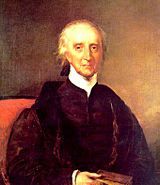 Charles Carroll Charles CarrollCharles Carroll of Carrollton Charles Carroll of Carrollton was a wealthy Maryland planter and an early advocate of independence from Great Britain. He served as a delegate to the Continental Congress and later as United States Senator for Maryland... |
Pro- Administration Pro-Administration Party (United States) Pro-Administration "Party" is a term by historians to describe the supporters of the policies of George Washington's administration — especially Treasury Secretary Alexander Hamilton's financial policies — prior to the formation of the Federalist and Democratic-Republican Parties.Almost the entire... |
March 4, 1789 – November 30, 1792 |
1 1st United States Congress -House of Representatives:During this congress, five House seats were added for North Carolina and one House seat was added for Rhode Island when they ratified the Constitution.-Senate:* President: John Adams * President pro tempore: John Langdon... |
1 | Elected in 1789 |
| 2 2nd United States Congress -House of Representatives:During this congress, two new House seats were added for each of the new states of Vermont and Kentucky. -Leadership:-Senate:*President: John Adams *President pro tempore:** Richard Henry Lee... |
2 | Re-elected in 1791 Resigned to remain in the Maryland Senate |
||||
| Vacant | November 30, 1792 – January 10, 1793 |
|||||
| 2 | Richard Potts Richard Potts Richard Potts was an American politician and jurist.-Early life and career:Potts was born in Upper Marlboro, Maryland, and lived there until he moved with his family to the Barbados Islands in 1757. He returned to Maryland and settled in the state capital of Annapolis in 1761, where he studied law... |
Pro- Administration Pro-Administration Party (United States) Pro-Administration "Party" is a term by historians to describe the supporters of the policies of George Washington's administration — especially Treasury Secretary Alexander Hamilton's financial policies — prior to the formation of the Federalist and Democratic-Republican Parties.Almost the entire... |
January 10, 1793 – October 24, 1796 |
2 2nd United States Congress -House of Representatives:During this congress, two new House seats were added for each of the new states of Vermont and Kentucky. -Leadership:-Senate:*President: John Adams *President pro tempore:** Richard Henry Lee... (Continued) |
Elected to finish Carroll's term Resigned |
|
| 3 3rd United States Congress The Third United States Congress was a meeting of the legislative branch of the United States federal government, consisting of the United States Senate and the United States House of Representatives... |
||||||
| 4 4th United States Congress -House of Representatives:- Senate :* President: John Adams * President pro tempore:** Henry Tazewell , first elected December 7, 1795** Samuel Livermore , first elected May 6, 1796** William Bingham , first elected February 16, 1797... |
||||||
| Vacant | October 24, 1796 – November 30, 1796 |
|||||
| 3 | John Eager Howard John Eager Howard John Eager Howard was an American soldier and politician from Maryland. He was elected as governor of the state in 1789, and served three one-year terms. He also was elected to the Continental Congress, Congress of the United States and the US Senate. He was born in and died in Baltimore County... |
Federalist Federalist Party (United States) The Federalist Party was the first American political party, from the early 1790s to 1816, the era of the First Party System, with remnants lasting into the 1820s. The Federalists controlled the federal government until 1801... |
November 30, 1796 – March 3, 1803 |
4 4th United States Congress -House of Representatives:- Senate :* President: John Adams * President pro tempore:** Henry Tazewell , first elected December 7, 1795** Samuel Livermore , first elected May 6, 1796** William Bingham , first elected February 16, 1797... (Continued) |
Elected to finish Potts's term | |
| 5 5th United States Congress The Fifth United States Congress was a meeting of the legislative branch of the United States federal government, consisting of the United States Senate and the United States House of Representatives... |
3 | Re-elected in 1796 United States Senate elections, 1796 The United States Senate election of 1796 was an election for the United States Senate which, coinciding with John Adams's election as President, had the ruling Federalist Party gain one seat.... |
||||
| 6 6th United States Congress The Sixth United States Congress was a meeting of the legislative branch of the United States federal government, consisting of the United States Senate and the United States House of Representatives. It met at Congress Hall in Philadelphia, Pennsylvania and in Washington, D.C. from March 4, 1799... |
||||||
| 7 7th United States Congress - House of Representatives :-Senate:* President: Aaron Burr * President pro tempore:** Abraham Baldwin , first elected December 7, 1801** Stephen R. Bradley , first elected December 14, 1802-House of Representatives:... |
||||||
| 4 | 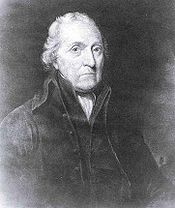 Samuel Smith Samuel SmithSamuel Smith (Maryland) Samuel Smith was a United States Senator and Representative from Maryland, a mayor of Baltimore, Maryland, and a general in the Maryland militia. He was the brother of cabinet secretary Robert Smith.-Biography:... |
Democratic-Republican Democratic-Republican Party (United States) The Democratic-Republican Party or Republican Party was an American political party founded in the early 1790s by Thomas Jefferson and James Madison. Political scientists use the former name, while historians prefer the latter one; contemporaries generally called the party the "Republicans", along... |
March 4, 1803 – March 3, 1815 |
8 8th United States Congress - Senate :* President: Aaron Burr * President pro tempore: John Brown , October 17, 1803 – February 26, 1804** Jesse Franklin , March 10, 1804 – November 4, 1804** Joseph Anderson , January 15, 1805 – December 1, 1805- House of Representatives :... |
4 | Elected in 1803 |
| 9 9th United States Congress - Senate :* President: George Clinton * President pro tempore: Samuel Smith - House of Representatives :* Speaker: Nathaniel Macon -Members:This list is arranged by chamber, then by state... |
||||||
| 10 10th United States Congress - House of Representatives :- Senate :*President: George Clinton *President pro tempore: Samuel Smith , elected April 16, 1808** Stephen R. Bradley , elected December 28, 1808** John Milledge , elected January 30, 1809... |
||||||
| 11 11th United States Congress - House of Representatives :-Leadership:- Senate :* President: George Clinton * President pro tempore:** John Milledge ** Andrew Gregg , elected June 26, 1809** John Gaillard , elected February 28, 1810... |
5 | Re-elected in 1809 |
||||
| 12 12th United States Congress - House of Representatives :During this congress, one new House seat was added for the new state of Louisiana.- Senate :*President: George Clinton *President pro tempore: William H. Crawford -House of Representatives:*Speaker: Henry Clay... |
||||||
| 13 13th United States Congress - Senate :* President: Elbridge Gerry , until November 23, 1814, thereafter vacant.* President pro tempore: Joseph B. Varnum , December 6, 1813 – February 3, 1814** John Gaillard , elected November 25, 1814- House of Representatives :... |
||||||
| Vacant | March 4, 1815 – February 4, 1816 |
14 14th United States Congress - Senate :* President: Vacant* President pro tempore: John Gaillard of South Carolina, first elected December 4, 1815- House of Representatives :* Speaker: Henry Clay of Kentucky-Members:This list is arranged by chamber, then by state... |
6 | Legislature failed to elect | ||
| 5 | 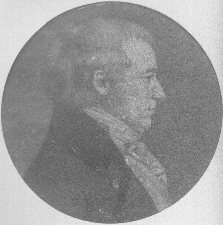 Robert Goodloe Harper Robert Goodloe HarperRobert Goodloe Harper Robert Goodloe Harper , a Federalist, was a member of the United States Senate from Maryland, serving from January 1816 until his resignation in December of the same year. He also served in the South Carolina House of Representatives , the U.S. House of Representatives from South Carolina , and in... |
Federalist Federalist Party (United States) The Federalist Party was the first American political party, from the early 1790s to 1816, the era of the First Party System, with remnants lasting into the 1820s. The Federalists controlled the federal government until 1801... |
February 5, 1816 – December 6, 1816 |
Elected late in 1815 |
||
| Vacant | December 6, 1816 – December 20, 1816 |
|||||
| 6 | 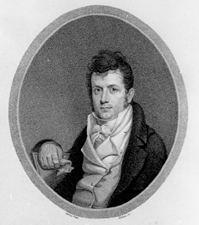 Alexander Contee Hanson Alexander Contee HansonAlexander Contee Hanson Alexander Contee Hanson was an American lawyer, publisher, and statesman. He represented the third district of Maryland in the U.S. House, and the state of Maryland in the U.S. Senate.... |
Federalist Federalist Party (United States) The Federalist Party was the first American political party, from the early 1790s to 1816, the era of the First Party System, with remnants lasting into the 1820s. The Federalists controlled the federal government until 1801... |
December 20, 1816 – April 23, 1819 |
14 14th United States Congress - Senate :* President: Vacant* President pro tempore: John Gaillard of South Carolina, first elected December 4, 1815- House of Representatives :* Speaker: Henry Clay of Kentucky-Members:This list is arranged by chamber, then by state... (Continued) |
Elected to finish Harper's term Died |
|
| 15 15th United States Congress -Leadership:- Senate :* President: Daniel D. Tompkins * President pro tempore:** John Gaillard , elected March 4, 1817** James Barbour , elected February 15, 1819- House of Representatives :*Speaker: Henry Clay -Members:... |
||||||
| 16 16th United States Congress -House of Representatives:During this congress, one House seat was added for the new state of Alabama and one seat was reapportioned from Massachusetts to the new state of Maine. For the beginning of the next congress, six more seats from Massachusetts would be reapportioned to... |
||||||
| Vacant | April 23, 1819 – December 21, 1819 |
|||||
| 7 | .jpg) William Pinkney William PinkneyWilliam Pinkney William Pinkney was an American statesman and diplomat, and the seventh U.S. Attorney General.-Biography:Born in Annapolis, Maryland, Pinkney studied medicine and law, becoming a lawyer after his admission to the bar in 1786... |
Democratic-Republican Democratic-Republican Party (United States) The Democratic-Republican Party or Republican Party was an American political party founded in the early 1790s by Thomas Jefferson and James Madison. Political scientists use the former name, while historians prefer the latter one; contemporaries generally called the party the "Republicans", along... |
December 21, 1819 – February 25, 1822 |
16 16th United States Congress -House of Representatives:During this congress, one House seat was added for the new state of Alabama and one seat was reapportioned from Massachusetts to the new state of Maine. For the beginning of the next congress, six more seats from Massachusetts would be reapportioned to... (Continued) |
Elected to finish Hanson's term | |
| 17 17th United States Congress The Seventeenth United States Congress was a meeting of the legislative branch of the United States federal government, consisting of the United States Senate and the United States House of Representatives. It met in Washington, D.C. from March 4, 1821 to March 3, 1823, during the fifth and sixth... |
7 | Re-elected in 1821 Died |
||||
| Vacant | February 25, 1822 – December 17, 1822 |
|||||
| 8 |  Samuel Smith Samuel SmithSamuel Smith (Maryland) Samuel Smith was a United States Senator and Representative from Maryland, a mayor of Baltimore, Maryland, and a general in the Maryland militia. He was the brother of cabinet secretary Robert Smith.-Biography:... |
Democratic-Republican Democratic-Republican Party (United States) The Democratic-Republican Party or Republican Party was an American political party founded in the early 1790s by Thomas Jefferson and James Madison. Political scientists use the former name, while historians prefer the latter one; contemporaries generally called the party the "Republicans", along... |
December 17, 1822 – March 3, 1833 |
17 17th United States Congress The Seventeenth United States Congress was a meeting of the legislative branch of the United States federal government, consisting of the United States Senate and the United States House of Representatives. It met in Washington, D.C. from March 4, 1821 to March 3, 1823, during the fifth and sixth... (Continued) |
Elected to finish Pinkney's term | |
| Crawford Republican Democratic-Republican Party (United States) The Democratic-Republican Party or Republican Party was an American political party founded in the early 1790s by Thomas Jefferson and James Madison. Political scientists use the former name, while historians prefer the latter one; contemporaries generally called the party the "Republicans", along... |
18 18th United States Congress The Eighteenth United States Congress was a meeting of the legislative branch of the United States federal government, consisting of the United States Senate and the United States House of Representatives. It met in Washington, D.C. from March 4, 1823 to March 3, 1825, during the seventh and eighth... |
|||||
| Jacksonian | 19 19th United States Congress -House of Representatives:-Leadership:- Senate :* President: John C. Calhoun * President pro tempore: John Gaillard , until December 4, 1825** Nathaniel Macon , from May 20, 1826- House of Representatives :* Speaker: John W. Taylor -Members:... |
|||||
| 20 20th United States Congress -House of Representatives:-Leadership:- Senate :* President: John C. Calhoun * President pro tempore: Samuel Smith - House of Representatives :* Speaker: Andrew Stevenson -Members:This list is arranged by chamber, then by state... |
8 | Re-elected in 1827 | ||||
| 21 21st United States Congress -House of Representatives:-Leadership:- Senate :* President: John C. Calhoun * President pro tempore: Samuel Smith - House of Representatives :* Speaker: Andrew Stevenson -Members:This list is arranged by chamber, then by state... |
||||||
| 22 22nd United States Congress -House of Representatives:-Leadership:- Senate :* President:** John C. Calhoun , resigned December 28, 1832, thereafter vacant.* President pro tempore:** Samuel Smith , first elected December 5, 1831** Littleton W... |
||||||
| 9 | 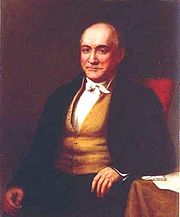 Joseph Kent Joseph KentJoseph Kent Joseph Kent , a Whig, was a United States Senator from Maryland, serving from 1833 until his death in 1837... |
Anti- Jacksonian |
March 4, 1833 – November 24, 1837 |
23 23rd United States Congress -House of Representatives:For the beginning of this congress, the size of the House was increased from 213 seats to 240 seats, following the 1830 United States Census .- Leadership :- Senate :* President: Martin Van Buren... |
9 | Elected in 1833 Died |
| 24 24th United States Congress -House of Representatives:During this congress one House seat was added for each of the new states of Arkansas and Michigan.-Leadership:- Senate :* President: Martin Van Buren * President pro tempore: William R. King - House of Representatives :... |
||||||
| Whig Whig Party (United States) The Whig Party was a political party of the United States during the era of Jacksonian democracy. Considered integral to the Second Party System and operating from the early 1830s to the mid-1850s, the party was formed in opposition to the policies of President Andrew Jackson and his Democratic... |
25 25th United States Congress -House of Representatives:-Leadership:- Senate :* President: Richard Mentor Johnson * President pro tempore: William R. King - House of Representatives :* Speaker: James K. Polk -Members:This list is arranged by chamber, then by state... |
|||||
| Vacant | November 24, 1837 – January 4, 1838 |
|||||
| 10 |  William Duhurst Merrick William Duhurst MerrickWilliam Duhurst Merrick William Duhurst Merrick was a United States Senator from Maryland, serving from 1838 to 1845.Merrick was born in Annapolis, Maryland and completed preparatory studies. He later graduated from Georgetown University in Washington, D.C..Merrick held several local offices and served in the War of 1812... |
Whig Whig Party (United States) The Whig Party was a political party of the United States during the era of Jacksonian democracy. Considered integral to the Second Party System and operating from the early 1830s to the mid-1850s, the party was formed in opposition to the policies of President Andrew Jackson and his Democratic... |
January 4, 1838 – March 3, 1845 |
25 25th United States Congress -House of Representatives:-Leadership:- Senate :* President: Richard Mentor Johnson * President pro tempore: William R. King - House of Representatives :* Speaker: James K. Polk -Members:This list is arranged by chamber, then by state... (Continued) |
Elected to finish Kent's term | |
| 26 26th United States Congress -House of Representatives:- Leadership :- Senate :*President: Richard M. Johnson *President pro tempore: William R. King - House of Representatives :*Speaker: Robert M.T. Hunter -Members:This list is arranged by chamber, then by state... |
10 | Re-elected in 1839 | ||||
| 27 27th United States Congress The Twenty-seventh United States Congress was a meeting of the legislative branch of the United States federal government, consisting of the United States Senate and the United States House of Representatives. It met in Washington, D.C. from March 4, 1841 to March 3, 1843, during the one-month... |
||||||
| 28 28th United States Congress -House of Representatives:Following the 1840 United States Census, Congress reapportioned the House to include 223 seats . During this congress, one House seat was added for the new state of Florida .- Senate :*President: Vacant... |
||||||
| 11 |  Reverdy Johnson Reverdy JohnsonReverdy Johnson Reverdy Johnson was a statesman and jurist from Maryland.-Early life:Born in Annapolis, Johnson was the son of a distinguished Maryland lawyer and politician, John Johnson . He graduated from St. John's College in 1812 and then studied law... |
Whig Whig Party (United States) The Whig Party was a political party of the United States during the era of Jacksonian democracy. Considered integral to the Second Party System and operating from the early 1830s to the mid-1850s, the party was formed in opposition to the policies of President Andrew Jackson and his Democratic... |
March 4, 1845 – March 7, 1849 |
29 29th United States Congress -House of Representatives:During this congress, two House seats were added for each of the new states of Texas and Iowa.-Leadership:-Senate:* President: George M. Dallas * President pro tempore: Willie P. Mangum... |
11 | Elected in 1845 Resigned to become U.S. Attorney General |
| 30 30th United States Congress The Thirtieth United States Congress was a meeting of the legislative branch of the United States federal government, consisting of the United States Senate and the United States House of Representatives. It met in Washington, D.C. from March 4, 1847 to March 3, 1849, during the last two years of... |
||||||
| 31 31st United States Congress The Thirty-first United States Congress was a meeting of the legislative branch of the United States federal government, consisting of the United States Senate and the United States House of Representatives. It met in Washington, D.C. from March 4, 1849 to March 3, 1851, during the last 17 months... |
||||||
| Vacant | March 7, 1849 – December 6, 1849 |
|||||
| 12 | David Stewart David Stewart (Maryland) David Stewart was an American Senator.Stewart was born in Baltimore, Maryland, completed preparatory studies, and attended the College of New Jersey . He graduated from Union College of Schenectady, New York in 1819... |
Whig Whig Party (United States) The Whig Party was a political party of the United States during the era of Jacksonian democracy. Considered integral to the Second Party System and operating from the early 1830s to the mid-1850s, the party was formed in opposition to the policies of President Andrew Jackson and his Democratic... |
December 6, 1849 – January 12, 1850 |
Appointed to continue Johnson's term Retired when successor elected |
||
| 13 | 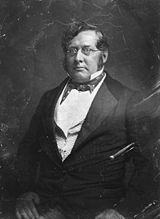 Thomas Pratt Thomas PrattThomas Pratt Thomas George Pratt was a lawyer and politician from Annapolis, Maryland. He was the 27th Governor of Maryland from 1845 to 1848 and a U.S. Senator from 1850 to 1857.-Early life and career:... |
Whig Whig Party (United States) The Whig Party was a political party of the United States during the era of Jacksonian democracy. Considered integral to the Second Party System and operating from the early 1830s to the mid-1850s, the party was formed in opposition to the policies of President Andrew Jackson and his Democratic... |
January 12, 1850 – March 3, 1857 |
Elected to finish Johnson's term | ||
| 32 32nd United States Congress The Thirty-second United States Congress was a meeting of the legislative branch of the United States federal government, consisting of the United States Senate and the United States House of Representatives. It met in Washington, D.C. from March 4, 1851 to March 3, 1853, during the third and... |
12 | Re-elected in 1851 | ||||
| 33 33rd United States Congress The Thirty-third United States Congress was a meeting of the legislative branch of the United States federal government, consisting of the United States Senate and the United States House of Representatives. It met in Washington, D.C. from March 4, 1853 to March 3, 1855, during the first two years... |
||||||
| 34 34th United States Congress The Thirty-fourth United States Congress was a meeting of the legislative branch of the United States federal government, consisting of the United States Senate and the United States House of Representatives. It met in Washington, D.C. from March 4, 1855 to March 4, 1857, during the last two years... |
||||||
| 14 | 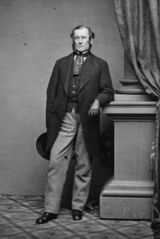 Anthony Kennedy Anthony KennedyAnthony Kennedy (Maryland) Anthony Kennedy was a United States Senator from Maryland, serving from 1857 to 1863. He was the brother of United States Secretary of the Navy John P. Kennedy.... |
American | March 4, 1857 – March 3, 1863 |
35 35th United States Congress The 35th United States Congress was a meeting of the legislative branch of the United States federal government, consisting of the United States Senate and the United States House of Representatives. It met in Washington, D.C. from March 4, 1857 to March 3, 1859, during the first two years of James... |
13 | Elected in 1857 |
| 36 36th United States Congress The Thirty-sixth United States Congress was a meeting of the legislative branch of the United States federal government, consisting of the United States Senate and the United States House of Representatives. It met in Washington, D.C. from March 4, 1859 to March 4, 1861, during the third and fourth... |
||||||
| 37 37th United States Congress The Thirty-seventh United States Congress was a meeting of the legislative branch of the United States federal government, consisting of the United States Senate and the United States House of Representatives. It met in Washington, D.C. from March 4, 1861 to March 4, 1863, during the first two... |
||||||
| 15 |  Reverdy Johnson Reverdy JohnsonReverdy Johnson Reverdy Johnson was a statesman and jurist from Maryland.-Early life:Born in Annapolis, Johnson was the son of a distinguished Maryland lawyer and politician, John Johnson . He graduated from St. John's College in 1812 and then studied law... |
Unionist Unionist Party (United States) The Union Party was a fusion political party conceived by Republicans in 1861 to combine people of all political affiliations into a single movement committed to the preservation of the Union and to war. Republicans wanted to project an image of wartime nonpartisanship and they also expected to... / Democratic Democratic Party (United States) The Democratic Party is one of two major contemporary political parties in the United States, along with the Republican Party. The party's socially liberal and progressive platform is largely considered center-left in the U.S. political spectrum. The party has the lengthiest record of continuous... |
March 4, 1863 – July 10, 1868 |
38 38th United States Congress -House of Representatives:Before this Congress, the 1860 United States Census and resulting reapportionment changed the size of the House to 241 members... |
14 | Elected in 1863 Resigned to become Ambassador to England United States Ambassador to the United Kingdom The office of United States Ambassador to the United Kingdom was traditionally, and still is very much so today due to the Special Relationship, the most prestigious position in the United States Foreign Service... |
| 39 39th United States Congress The Thirty-ninth United States Congress was a meeting of the legislative branch of the United States federal government, consisting of the United States Senate and the United States House of Representatives. It met in Washington, D.C. from March 4, 1865 to March 4, 1867, during the first month of... |
||||||
| 40 40th United States Congress The Fortieth United States Congress was a meeting of the legislative branch of the United States federal government, consisting of the United States Senate and the United States House of Representatives. It met in Washington, D.C. from March 4, 1867 to March 4, 1869, during the third and fourth... |
||||||
| Vacant | July 10, 1868 – July 13, 1868 |
|||||
| 16 | 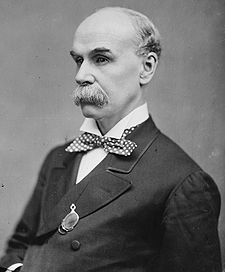 William Pinkney Whyte William Pinkney WhyteWilliam Pinkney Whyte William Pinkney Whyte , a member of the United States Democratic Party, was a politician who served the State of Maryland as a State Delegate, the State Comptroller, a United States Senator, the 35th Governor, the Mayor of Baltimore, Maryland, and the State Attorney General.-Early life and... |
Democratic Democratic Party (United States) The Democratic Party is one of two major contemporary political parties in the United States, along with the Republican Party. The party's socially liberal and progressive platform is largely considered center-left in the U.S. political spectrum. The party has the lengthiest record of continuous... |
July 13, 1868 – March 3, 1869 |
40 40th United States Congress The Fortieth United States Congress was a meeting of the legislative branch of the United States federal government, consisting of the United States Senate and the United States House of Representatives. It met in Washington, D.C. from March 4, 1867 to March 4, 1869, during the third and fourth... (Continued) |
Appointed to finish Johnson's term Retired |
|
| 17 | 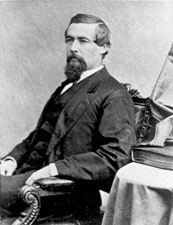 William Thomas Hamilton William Thomas HamiltonWilliam Thomas Hamilton William Thomas Hamilton , a member of the United States Democratic Party, was the 38th Governor of Maryland in the United States from 1880 to 1884... |
Democratic Democratic Party (United States) The Democratic Party is one of two major contemporary political parties in the United States, along with the Republican Party. The party's socially liberal and progressive platform is largely considered center-left in the U.S. political spectrum. The party has the lengthiest record of continuous... |
March 4, 1869 – March 3, 1875 |
41 41st United States Congress -House of Representatives:- Senate :* President : Schuyler Colfax* President pro tempore: Henry B. Anthony - House of Representatives :* Speaker: James G. Blaine -Members:This list is arranged by chamber, then by state... |
15 | Elected in 1869 Retired to run for Governor |
| 42 42nd United States Congress The Forty-second United States Congress was a meeting of the legislative branch of the United States federal government, consisting of the United States Senate and the United States House of Representatives. It met in Washington, D.C. from March 4, 1871 to March 3, 1873, during the third and fourth... |
||||||
| 43 43rd United States Congress The Forty-third United States Congress was a meeting of the legislative branch of the United States federal government, consisting of the United States Senate and the United States House of Representatives. It met in Washington, D.C. from March 4, 1873 to March 4, 1875, during the fifth and sixth... |
||||||
| 18 |  William Pinkney Whyte William Pinkney WhyteWilliam Pinkney Whyte William Pinkney Whyte , a member of the United States Democratic Party, was a politician who served the State of Maryland as a State Delegate, the State Comptroller, a United States Senator, the 35th Governor, the Mayor of Baltimore, Maryland, and the State Attorney General.-Early life and... |
Democratic Democratic Party (United States) The Democratic Party is one of two major contemporary political parties in the United States, along with the Republican Party. The party's socially liberal and progressive platform is largely considered center-left in the U.S. political spectrum. The party has the lengthiest record of continuous... |
March 4, 1875 – March 3, 1881 |
44 44th United States Congress The Forty-fourth United States Congress was a meeting of the legislative branch of the United States federal government, consisting of the United States Senate and the United States House of Representatives. It met in Washington, D.C. from March 4, 1875 to March 4, 1877, during the seventh and... |
16 | Elected in 1875 Lost re-election |
| 45 45th United States Congress -House of Representatives:-Leadership:-Senate:*President: William A. Wheeler *President pro tempore: Thomas W. Ferry -House of Representatives:*Speaker: Samuel J. Randall -Members:This list is arranged by chamber, then by state... |
||||||
| 46 46th United States Congress The Forty-sixth United States Congress was a meeting of the legislative branch of the United States federal government, consisting of the United States Senate and the United States House of Representatives. It met in Washington, D.C. from March 4, 1879 to March 4, 1881, during the last two years of... |
||||||
| 19 | 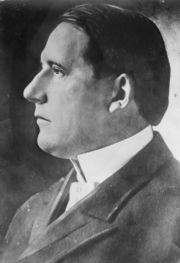 Arthur Pue Gorman Arthur Pue GormanArthur Pue Gorman Arthur Pue Gorman was a United States Senator from Maryland, serving from 1881 to 1899 and from 1903 to 1906. He also served in the Maryland House of Delegates from 1869 to 1875... |
Democratic Democratic Party (United States) The Democratic Party is one of two major contemporary political parties in the United States, along with the Republican Party. The party's socially liberal and progressive platform is largely considered center-left in the U.S. political spectrum. The party has the lengthiest record of continuous... |
March 4, 1881 – March 3, 1899 |
47 47th United States Congress The Forty-seventh United States Congress was a meeting of the legislative branch of the United States federal government, consisting of the United States Senate and the United States House of Representatives. It met in Washington, D.C. from March 4, 1881 to March 4, 1883, during the administration... |
17 | Elected in 1881 |
| 48 48th United States Congress The Forty-eighth United States Congress was a meeting of the legislative branch of the United States federal government, consisting of the United States Senate and the United States House of Representatives. It met in Washington, D.C. from March 4, 1883 to March 4, 1885, during the last two years... |
||||||
| 49 49th United States Congress The Forty-ninth United States Congress was a meeting of the legislative branch of the United States federal government, consisting of the United States Senate and the United States House of Representatives. It met in Washington, D.C. from March 4, 1885 to March 4, 1887, during the first two years... |
||||||
| 50 50th United States Congress The Fiftieth United States Congress was a meeting of the legislative branch of the United States federal government, consisting of the United States Senate and the United States House of Representatives. It met in Washington, D.C. from March 4, 1887 to March 4, 1889, during the third and fourth... |
18 | Re-elected in 1887 | ||||
| 51 51st United States Congress The Fifty-first United States Congress, referred to by some critics as the Billion Dollar Congress, was a meeting of the legislative branch of the United States federal government, consisting of the United States Senate and the United States House of Representatives. It met in Washington, D.C... |
||||||
| 52 52nd United States Congress The Fifty-second United States Congress was a meeting of the legislative branch of the United States federal government, consisting of the United States Senate and the United States House of Representatives. It met in Washington, D.C... |
||||||
| 53 53rd United States Congress The Fifty-third United States Congress was a meeting of the legislative branch of the United States federal government, consisting of the United States Senate and the United States House of Representatives. It met in Washington, D.C. from March 4, 1893 to March 4, 1895, during the fifth and sixth... |
19 | Elected in 1893 Lost re-election |
||||
| 54 54th United States Congress - House of Representatives :-Leadership:- Senate :* President: Adlai E. Stevenson * President pro tempore: William P. Frye - Majority leadership :* Republican Conference Chairman: John Sherman- Minority leadership :... |
||||||
| 55 55th United States Congress -House of Representatives:* Republican: 206 * Democratic: 124* Populist: 22* Silver Republican: 3* Silver: 1* Independent Republican: 1TOTAL members: 357-Leadership:-Senate:* President: Garret Hobart * President pro tempore: William P... |
||||||
| 20 | 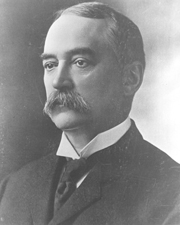 Louis E. McComas Louis E. McComasLouis E. McComas Louis Emory McComas , a Republican, was a member of the U.S. Congress from the sixth district of Maryland from 1883 to 1891, and a member of the United States Senate from 1899 to 1905, each time representing the State of Maryland. His granddaughter, Katharine Byron, and great-grandson, Goodloe... |
Republican Republican Party (United States) The Republican Party is one of the two major contemporary political parties in the United States, along with the Democratic Party. Founded by anti-slavery expansion activists in 1854, it is often called the GOP . The party's platform generally reflects American conservatism in the U.S... |
March 4, 1899 – March 3, 1905 |
56 56th United States Congress -House of Representatives:- Leadership :- Senate :* President: Garret Hobart , until November 21, 1899 , vacant thereafter.* President pro tempore: William P. Frye * Democratic Caucus Chairman: James K. Jones... |
20 | Elected in 1899 Retired to become judge of the U.S. Court of Appeals United States Court of Appeals for the District of Columbia Circuit The United States Court of Appeals for the District of Columbia Circuit known informally as the D.C. Circuit, is the federal appellate court for the U.S. District Court for the District of Columbia. Appeals from the D.C. Circuit, as with all the U.S. Courts of Appeals, are heard on a... |
| 57 57th United States Congress -House of Representatives:*Democratic: 151*Republican: 200 *Populist: 5*Silver : 1TOTAL members: 357-Leadership:-Senate:* President: Theodore Roosevelt , until September 14, 1901, vacant thereafter.... |
||||||
| 58 58th United States Congress - House of Representatives :* Republican : 209 * Democratic : 176* Silver Republican : 1TOTAL members: 386-Senate:* President: Vacant* President pro tempore: William P. Frye -Members:... |
||||||
| 21 | 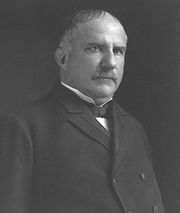 Isidor Rayner Isidor RaynerIsidor Rayner Isidor Rayner was a Democratic member of the United States Senate, representing the State of Maryland from 1905-1912. He also represented the Fourth Congressional District of Maryland from 1887 to 1889, and 1891 to 1895.... |
Democratic Democratic Party (United States) The Democratic Party is one of two major contemporary political parties in the United States, along with the Republican Party. The party's socially liberal and progressive platform is largely considered center-left in the U.S. political spectrum. The party has the lengthiest record of continuous... |
March 4, 1905 – November 25, 1912 |
59 59th United States Congress The Fifty-ninth United States Congress was a meeting of the legislative branch of the United States federal government, composed of the United States Senate and the United States House of Representatives. It met in Washington, DC from March 4, 1905 to March 4, 1907, during the fifth and sixth... |
21 | Elected in 1905 |
| 60 60th United States Congress The Sixtieth United States Congress was a meeting of the legislative branch of the United States federal government, composed of the United States Senate and the United States House of Representatives. It met in Washington, DC from March 4, 1907 to March 4, 1909, during the last two years of... |
||||||
| 61 61st United States Congress The Sixty-first United States Congress was a meeting of the legislative branch of the United States federal government, composed of the United States Senate and the United States House of Representatives. It met in Washington, DC from March 4, 1909 to March 4, 1911, during the first two years of... |
||||||
| 62 62nd United States Congress - House of Representatives :* Democratic : 230 * Republican : 162* Socialist : 1* Independent : 1TOTAL members: 394-Senate:* President: James S... |
22 | Re-elected in 1911 Died |
||||
| Vacant | November 25, 1912 – November 29, 1912 |
|||||
| 22 | 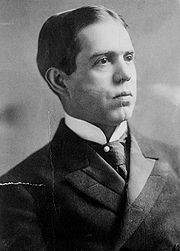 William P. Jackson William P. Jackson |
Republican Republican Party (United States) The Republican Party is one of the two major contemporary political parties in the United States, along with the Democratic Party. Founded by anti-slavery expansion activists in 1854, it is often called the GOP . The party's platform generally reflects American conservatism in the U.S... |
November 29, 1912 – January 28, 1914 |
62 62nd United States Congress - House of Representatives :* Democratic : 230 * Republican : 162* Socialist : 1* Independent : 1TOTAL members: 394-Senate:* President: James S... (Continued) |
Appointed to continue Rayner's term Retired when successor elected |
|
| 63 63rd United States Congress - House of Representatives:*Democratic : 291 *Republican : 134*Progressive : 9*Independent : 1TOTAL members: 435-Senate:*President of the Senate: Thomas R. Marshall*President pro tempore: James P. Clarke-Senate:... |
||||||
| 23 | 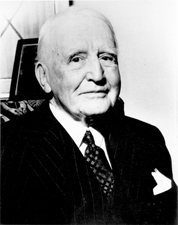 Blair Lee Blair LeeBlair Lee I Francis Preston Blair Lee was a Democratic member of the United States Senate, representing the State of Maryland from 1914 to 1917. He was also the great-grandson of American patriot Richard Henry Lee, and grandfather of former Maryland Governor Blair Lee III... |
Democratic Democratic Party (United States) The Democratic Party is one of two major contemporary political parties in the United States, along with the Republican Party. The party's socially liberal and progressive platform is largely considered center-left in the U.S. political spectrum. The party has the lengthiest record of continuous... |
January 28, 1914 – March 3, 1917 |
Elected to finish Rayner's term Lost re-election |
||
| 64 64th United States Congress The Sixty-fourth United States Congress was a meeting of the legislative branch of the United States federal government, composed of the United States Senate and the United States House of Representatives. It met in Washington, DC from March 4, 1915 to March 4, 1917, during the third and fourth... |
||||||
| 24 |  Joseph I. France Joseph I. FranceJoseph I. France Joseph Irwin France was a Republican member of the United States Senate, representing the State of Maryland from 1917–1923.-Early life:... |
Republican Republican Party (United States) The Republican Party is one of the two major contemporary political parties in the United States, along with the Democratic Party. Founded by anti-slavery expansion activists in 1854, it is often called the GOP . The party's platform generally reflects American conservatism in the U.S... |
March 4, 1917 – March 3, 1923 |
65 65th United States Congress The Sixty-fifth United States Congress was a meeting of the legislative branch of the United States federal government, composed of the United States Senate and the United States House of Representatives. It met in Washington, DC from March 4, 1917 to March 4, 1919, during the fourth and fifth... |
23 | Elected in 1916 Lost re-election |
| 66 66th United States Congress The Sixty-sixth United States Congress was a meeting of the legislative branch of the United States federal government, comprising the United States Senate and the United States House of Representatives. It met in Washington, DC from March 4, 1919 to March 4, 1921, during the last two years of... |
||||||
| 67 67th United States Congress The Sixty-seventh United States Congress was a meeting of the legislative branch of the United States federal government, consisting of the United States Senate and the United States House of Representatives. It met in Washington, D.C. from March 4, 1921 to March 4, 1923, during the first two years... |
||||||
| 25 | 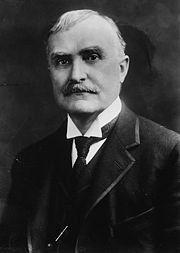 William Cabell Bruce William Cabell BruceWilliam Cabell Bruce William Cabell Bruce was an American politician and Pulitzer Prize-winning writer who represented the State of Maryland in the United States Senate from 1923 to 1929.... |
Democratic Democratic Party (United States) The Democratic Party is one of two major contemporary political parties in the United States, along with the Republican Party. The party's socially liberal and progressive platform is largely considered center-left in the U.S. political spectrum. The party has the lengthiest record of continuous... |
March 4, 1923 – March 3, 1929 |
68 68th United States Congress The Sixty-eighth United States Congress was a meeting of the legislative branch of the United States federal government, consisting of the United States Senate and the United States House of Representatives. It met in Washington, D.C. from March 4, 1923 to March 4, 1925, during the last months of... |
24 | Elected in 1922 Lost re-election |
| 69 69th United States Congress The Sixty-ninth United States Congress was a meeting of the legislative branch of the United States federal government, consisting of the United States Senate and the United States House of Representatives. It met in Washington, D.C. from March 4, 1925 to March 4, 1927, during the third and fourth... |
||||||
| 70 70th United States Congress The Seventieth United States Congress was a meeting of the legislative branch of the United States federal government, consisting of the United States Senate and the United States House of Representatives. It met in Washington, D.C. from March 4, 1927 to March 3, 1929, during the last two years of... |
||||||
| 26 | 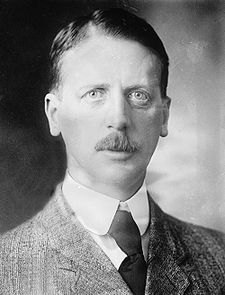 Phillips Lee Goldsborough Phillips Lee GoldsboroughPhillips Lee Goldsborough Phillips Lee Goldsborough I , was a Republican member of the United States Senate representing State of Maryland from 1929 to 1935... |
Republican Republican Party (United States) The Republican Party is one of the two major contemporary political parties in the United States, along with the Democratic Party. Founded by anti-slavery expansion activists in 1854, it is often called the GOP . The party's platform generally reflects American conservatism in the U.S... |
March 4, 1929 – January 3, 1935 |
71 71st United States Congress The Seventy-first United States Congress was a meeting of the legislative branch of the United States federal government, consisting of the United States Senate and the United States House of Representatives. It met in Washington, D.C. from March 4, 1929 to March 4, 1931, during the first two years... |
25 | Elected in 1928 Retired to run for Governor |
| 72 72nd United States Congress The Seventy-second United States Congress was a meeting of the legislative branch of the United States federal government, consisting of the United States Senate and the United States House of Representatives. It met in Washington, D.C. from March 4, 1931 to March 4, 1933, during the last two years... |
||||||
| 73 73rd United States Congress The Seventy-third United States Congress was a meeting of the legislative branch of the United States federal government, composed of the United States Senate and the United States House of Representatives. It met in Washington, DC from March 4, 1933 to January 3, 1935, during the first two years... |
||||||
| 27 | 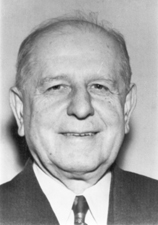 George L. P. Radcliffe George L. P. RadcliffeGeorge L. P. Radcliffe George Lovic Pierce Radcliffe was a Democratic member of the United States Senate, representing the State of Maryland from 1935-1947.Radcliffe was born on a farm at Lloyds, near Cambridge, Maryland... |
Democratic Democratic Party (United States) The Democratic Party is one of two major contemporary political parties in the United States, along with the Republican Party. The party's socially liberal and progressive platform is largely considered center-left in the U.S. political spectrum. The party has the lengthiest record of continuous... |
January 3, 1935 – January 3, 1947 |
74 74th United States Congress -House:Also 2 Delegates, 3 Resident Commissioners-Senate:*President of the Senate: John N. Garner *President pro tempore: Key Pittman -Majority leadership:*Majority leader: Joseph T. Robinson... |
26 | Elected in 1934 |
| 75 75th United States Congress The Seventy-fifth United States Congress was a meeting of the legislative branch of the United States federal government, composed of the United States Senate and the United States House of Representatives. It met in Washington, DC from January 3, 1937 to January 3, 1939, during the first two years... |
||||||
| 76 76th United States Congress The Seventy-sixth United States Congress was a meeting of the legislative branch of the United States federal government, composed of the United States Senate and the United States House of Representatives. It met in Washington, DC from January 3, 1939 to January 3, 1941, during the seventh and... |
||||||
| 77 77th United States Congress -Major events:* December 7, 1941: Attack on Pearl Harbor* December 8, 1941: Joint Session of Congress met to hear President Roosevelt deliver his "Day of Infamy" speech... |
27 | Re-elected in 1940 Lost renomination |
||||
| 78 78th United States Congress The Seventy-eighth United States Congress was a meeting of the legislative branch of the United States federal government, composed of the United States Senate and the United States House of Representatives. It met in Washington, DC from January 3, 1943 to January 3, 1945, during the last two years... |
||||||
| 79 79th United States Congress The Seventy-ninth United States Congress was a meeting of the legislative branch of the United States federal government, composed of the United States Senate and the United States House of Representatives. It met in Washington, DC from January 3, 1945 to January 3, 1947, during the last months of... |
||||||
| 28 | 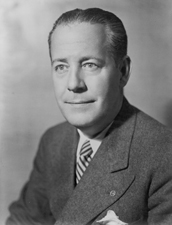 Herbert O'Conor Herbert O'ConorHerbert O'Conor Herbert Romulus O'Conor , a Democrat, was the 51st Governor of Maryland in the United States from 1939 to 1947. He also served in the United States Senate, representing Maryland from 1947 to 1953.... |
Democratic Democratic Party (United States) The Democratic Party is one of two major contemporary political parties in the United States, along with the Republican Party. The party's socially liberal and progressive platform is largely considered center-left in the U.S. political spectrum. The party has the lengthiest record of continuous... |
January 3, 1947 – January 3, 1953 |
80 80th United States Congress The Eightieth United States Congress was a meeting of the legislative branch of the United States federal government, composed of the United States Senate and the United States House of Representatives. It met in Washington, DC from January 3, 1947 to January 3, 1949, during the third and fourth... |
28 | Elected in 1946 Retired |
| 81 81st United States Congress The Eighty-first United States Congress was a meeting of the legislative branch of the United States federal government, composed of the United States Senate and the United States House of Representatives... |
||||||
| 82 82nd United States Congress The Eighty-second United States Congress was a meeting of the legislative branch of the United States federal government, composed of the United States Senate and the United States House of Representatives. It met in Washington, DC from January 3, 1951 to January 3, 1953, during the last two years... |
||||||
| 29 | 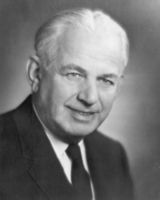 James Glenn Beall James Glenn BeallJames Glenn Beall James Glenn Beall was a Republican member of the United States Senate, representing the State of Maryland from 1953–1965. He was also a United States Congressman, representing the sixth district of Maryland from 1943–1953.-Biography:... |
Republican Republican Party (United States) The Republican Party is one of the two major contemporary political parties in the United States, along with the Democratic Party. Founded by anti-slavery expansion activists in 1854, it is often called the GOP . The party's platform generally reflects American conservatism in the U.S... |
January 3, 1953 – January 3, 1965 |
83 83rd United States Congress The Eighty-third United States Congress was a meeting of the legislative branch of the United States federal government, composed of the United States Senate and the United States House of Representatives. It met in Washington, DC from January 3, 1953 to January 3, 1955, during the first two years... |
29 | Elected in 1952 |
| 84 84th United States Congress The Eighty-fourth United States Congress was a meeting of the legislative branch of the United States federal government, composed of the United States Senate and the United States House of Representatives. It met in Washington, DC from January 3, 1955 to January 3, 1957, during the third and... |
||||||
| 85 85th United States Congress The Eighty-fifth United States Congress was a meeting of the legislative branch of the United States federal government, composed of the United States Senate and the United States House of Representatives. It met in Washington, DC from January 3, 1957 to January 3, 1959, during the fifth and sixth... |
||||||
| 86 86th United States Congress The Eighty-sixth United States Congress was a meeting of the legislative branch of the United States federal government, composed of the United States Senate and the United States House of Representatives. It met in Washington, DC from January 3, 1959 to January 3, 1961, during the last two years... |
30 | Re-elected in 1958 Lost re-election |
||||
| 87 87th United States Congress -House of Representatives :-Senate:* President: Richard Nixon , until January 20, 1961** Lyndon Johnson , from January 20, 1961* President pro tempore: Carl Hayden -House of Representatives:... |
||||||
| 88 88th United States Congress The Eighty-eighth United States Congress was a meeting of the legislative branch of the United States federal government, composed of the United States Senate and the United States House of Representatives. It met in Washington, DC from January 3, 1963 to January 3, 1965, during the last year of... |
||||||
| 30 | 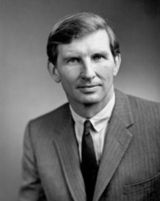 Joseph Tydings Joseph TydingsJoseph Tydings Joseph Davies Tydings is a former Democratic member of the United States Senate, representing the state of Maryland from 1965 to 1971.... |
Democratic Democratic Party (United States) The Democratic Party is one of two major contemporary political parties in the United States, along with the Republican Party. The party's socially liberal and progressive platform is largely considered center-left in the U.S. political spectrum. The party has the lengthiest record of continuous... |
January 3, 1965 – January 3, 1971 |
89 89th United States Congress -House of Representatives:- Senate :* President of the Senate: Hubert Humphrey , starting January 20, 1965* President pro tempore: Carl Hayden - Majority leadership :* Majority Leader and Democratic Conference Chairman: Mike Mansfield... |
31 | Elected in 1964 Lost re-election |
| 90 90th United States Congress The Ninetieth United States Congress was a meeting of the legislative branch of the United States federal government, composed of the United States Senate and the United States House of Representatives. It met in Washington, DC from January 3, 1967 to January 3, 1969, during the last two years of... |
||||||
| 91 91st United States Congress The Ninety-first United States Congress was a meeting of the legislative branch of the United States federal government, composed of the United States Senate and the United States House of Representatives. It met in Washington, DC from January 3, 1969 to January 3, 1971, during the first two years... |
||||||
| 31 | 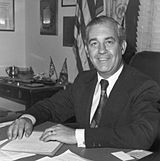 John Glenn Beall John Glenn Beall |
Republican Republican Party (United States) The Republican Party is one of the two major contemporary political parties in the United States, along with the Democratic Party. Founded by anti-slavery expansion activists in 1854, it is often called the GOP . The party's platform generally reflects American conservatism in the U.S... |
January 3, 1971 – January 3, 1977 |
92 92nd United States Congress The Ninety-second United States Congress was a meeting of the legislative branch of the United States federal government, composed of the United States Senate and the United States House of Representatives... |
32 | Elected in 1970 Lost re-election |
| 93 93rd United States Congress The Ninety-third United States Congress was a meeting of the legislative branch of the United States federal government, composed of the United States Senate and the United States House of Representatives. It met in Washington, DC from January 3, 1973 to January 3, 1975, during the end of Richard... |
||||||
| 94 94th United States Congress The Ninety-fourth United States Congress was a meeting of the legislative branch of the United States federal government, composed of the United States Senate and the United States House of Representatives. It met in Washington, DC from January 3, 1975 to January 3, 1977, during the administration... |
||||||
| 32 | 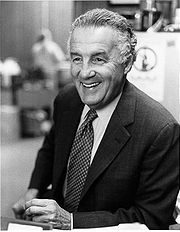 Paul Sarbanes Paul SarbanesPaul Sarbanes Paul Spyros Sarbanes , a Democrat, is a former United States Senator who represented the state of Maryland. Sarbanes was the longest-serving senator in Maryland history, having served from 1977 until 2007. He did not seek re-election in 2006, when he was succeeded by fellow Democrat Ben Cardin... |
Democratic Democratic Party (United States) The Democratic Party is one of two major contemporary political parties in the United States, along with the Republican Party. The party's socially liberal and progressive platform is largely considered center-left in the U.S. political spectrum. The party has the lengthiest record of continuous... |
January 3, 1977 – January 3, 2007 |
95 95th United States Congress The Ninety-fifth United States Congress was a meeting of the legislative branch of the United States federal government, composed of the United States Senate and the United States House of Representatives. It met in Washington, DC from January 3, 1977 to January 3, 1979, during the first two years... |
33 | Elected in 1976 |
| 96 96th United States Congress The Ninety-sixth United States Congress was a meeting of the legislative branch of the United States federal government, composed of the United States Senate and the United States House of Representatives. It met in Washington, DC from January 3, 1979 to January 3, 1981, during the last two years... |
||||||
| 97 97th United States Congress The Ninety-seventh United States Congress was a meeting of the legislative branch of the United States federal government, composed of the United States Senate and the United States House of Representatives. It met in Washington, DC from January 3, 1981 to January 3, 1983, during the final weeks of... |
||||||
| 98 98th United States Congress The Ninety-eighth United States Congress was a meeting of the legislative branch of the United States federal government, composed of the United States Senate and the United States House of Representatives. It met in Washington, DC from January 3, 1983 to January 3, 1985, during the third and... |
34 | Re-elected in 1982 United States Senate elections, 1982 The United States Senate election of November 2, 1982 was an election for the United States Senate following the Republican gains in 1980. Party balance was unchanged following the election. Incumbents Howard Cannon of Nevada and Harrison Schmitt of New Mexico lost seats to the opposite party, the... |
||||
| 99 99th United States Congress The Ninety-ninth United States Congress was a meeting of the legislative branch of the United States federal government, composed of the United States Senate and the United States House of Representatives. It met in Washington, DC from January 3, 1985 to January 3, 1987, during the fifth and sixth... |
||||||
| 100 100th United States Congress -House of Representatives:- Senate :* President: George H.W. Bush * President pro tempore: John Stennis - Majority leadership :* Majority Leader, Democratic Conference Chairman, and Democratic Policy Committee Chairman: Robert Byrd... |
||||||
| 101 101st United States Congress The One Hundred First United States Congress was a meeting of the legislative branch of the United States federal government, composed of the United States Senate and the United States House of Representatives. It met in Washington, DC from January 3, 1989 to January 3, 1991, during the first two... |
35 | Re-elected in 1988 United States Senate election in Maryland, 1988 The 1988 United States Senate Election in Maryland was held on November 7, 1988. Incumbent Democratic Senator Paul Sarbanes won re-election to a third term.-Republican:*Alan Keyes, former Assistant Secretary of State for International Organization Affairs... |
||||
| 102 102nd United States Congress -House of Representatives:- Senate :* President:Dan Quayle * President pro tempore: Robert Byrd - Majority leadership :* Majority Leader: George Mitchell* Majority Whip: Wendell Ford- Minority leadership :... |
||||||
| 103 103rd United States Congress - House of Representatives :- Leadership :- Senate :* President: Dan Quayle , until January 20, 1993** Al Gore , from January 20, 1993* President pro tempore: Robert Byrd - Majority leadership :* Majority Leader: George Mitchell... |
||||||
| 104 104th United States Congress The One Hundred Fourth United States Congress was a meeting of the legislative branch of the United States federal government, composed of the United States Senate and the United States House of Representatives. It met in Washington, DC from January 3, 1995 to January 3, 1997, during the third and... |
36 | Re-elected in 1994 United States Senate election in Maryland, 1994 The 1994 United States Senate Election in Maryland was held on November 7, 1994. Incumbent Democratic Senator Paul Sarbanes won re-election to a fourth term.-Results:... |
||||
| 105 105th United States Congress The One Hundred Fifth United States Congress was a meeting of the legislative branch of the United States federal government, composed of the United States Senate and the United States House of Representatives. It met in Washington, DC from January 3, 1997 to January 3, 1999, during the fifth and... |
||||||
| 106 106th United States Congress The One Hundred Sixth United States Congress was a meeting of the legislative branch of the United States federal government, composed of the United States Senate and the United States House of Representatives. It met in Washington, DC from January 3, 1999 to January 3, 2001, during the last two... |
||||||
| 107 107th United States Congress The One Hundred Seventh United States Congress was a meeting of the legislative branch of the United States federal government, composed of the United States Senate and the United States House of Representatives. It met in Washington, D.C. from January 3, 2001 to January 3, 2003, during the final... |
37 | Re-elected in 2000 United States Senate election in Maryland, 2000 The 2000 United States Senate election in Maryland was held on November 7, 2000. Incumbent Democratic U.S. Senator Paul Sarbanes won re-election to a fifth term.-Republican:... Retired |
||||
| 108 108th United States Congress The One Hundred Eighth United States Congress was the legislative branch of the United States federal government, composed of the United States Senate and the United States House of Representatives from January 3, 2003 to January 3, 2005, during the third and fourth years of George W. Bush's... |
||||||
| 109 109th United States Congress The One Hundred Ninth United States Congress was the legislative branch of the United States, composed of the United States Senate and the United States House of Representatives, from January 3, 2005 to January 3, 2007, during the fifth and sixth years of George W. Bush's presidency. House members... |
||||||
| 33 | 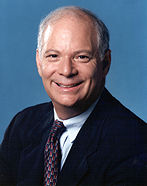 Benjamin L. Cardin Benjamin L. Cardin |
Democratic Democratic Party (United States) The Democratic Party is one of two major contemporary political parties in the United States, along with the Republican Party. The party's socially liberal and progressive platform is largely considered center-left in the U.S. political spectrum. The party has the lengthiest record of continuous... |
January 3, 2007 – Present |
110 110th United States Congress The One Hundred Tenth United States Congress was the meeting of the legislative branch of the United States federal government, between January 3, 2007, and January 3, 2009, during the last two years of the second term of President George W. Bush. It was composed of the Senate and the House of... |
38 | Elected in 2006 |
| 111 111th United States Congress The One Hundred Eleventh United States Congress was the meeting of the legislative branch of the United States federal government from January 3, 2009 until January 3, 2011. It began during the last two weeks of the George W. Bush administration, with the remainder spanning the first two years of... |
||||||
| 112 112th United States Congress The One Hundred Twelfth United States Congress is the current meeting of the legislative branch of the United States federal government, composed of the United States Senate and the United States House of Representatives. It convened in Washington, D.C. on January 3, 2011, and will end on January... |
||||||
Class 3
Class 3Classes of United States Senators
The three classes of United States Senators are currently made up of 33 or 34 Senate seats. The purpose of the classes is to determine which Senate seats will be up for election in a given year. The three groups are staggered so that one of them is up for election every two years.A senator's...
U.S. Senators
United States Senate
The United States Senate is the upper house of the bicameral legislature of the United States, and together with the United States House of Representatives comprises the United States Congress. The composition and powers of the Senate are established in Article One of the U.S. Constitution. Each...
belong to the electoral cycle that were elected for three sessions of the U.S. Congress in the first election of 1788 and whose seats in recent years are contested in 1998
United States Senate election in Maryland, 1998
The 1998 United States Senate election in Maryland was held on November 3, 2004. Incumbent Democrat U.S. Senator Barbara Mikulski won re-election to a third term.-Results:-Candidates:*Ross Pierpont*John Taylor*Michael Gloth*Kenneth Wayman...
, 2004
United States Senate election in Maryland, 2004
The 2004 United States Senate election in Maryland was held on November 2, 2004. Incumbent Democrat U.S. Senator Barbara Mikulski won re-election to a fourth term.- Candidates :*Barbara Mikulski, incumbent U.S. Senator*Robert Kaufman, social organizer...
, 2010
United States Senate election in Maryland, 2010
The 2010 United States Senate election in Maryland was held on November 2, 2010. Primary elections were held on September 14, 2010. Incumbent Democratic U.S. Senator Barbara Mikulski won re-election to a fifth term.-Background:...
, and 2016.
| # | Senator | Party | Years | Congress | Term | Electoral history |
|---|---|---|---|---|---|---|
| 1 |  John Henry John Henry |
Pro- Administration Pro-Administration Party (United States) Pro-Administration "Party" is a term by historians to describe the supporters of the policies of George Washington's administration — especially Treasury Secretary Alexander Hamilton's financial policies — prior to the formation of the Federalist and Democratic-Republican Parties.Almost the entire... |
March 4, 1789 – December 10, 1797 |
1 1st United States Congress -House of Representatives:During this congress, five House seats were added for North Carolina and one House seat was added for Rhode Island when they ratified the Constitution.-Senate:* President: John Adams * President pro tempore: John Langdon... |
1 | Elected in 1789 |
| 2 2nd United States Congress -House of Representatives:During this congress, two new House seats were added for each of the new states of Vermont and Kentucky. -Leadership:-Senate:*President: John Adams *President pro tempore:** Richard Henry Lee... |
||||||
| 3 3rd United States Congress The Third United States Congress was a meeting of the legislative branch of the United States federal government, consisting of the United States Senate and the United States House of Representatives... |
||||||
| 4 4th United States Congress -House of Representatives:- Senate :* President: John Adams * President pro tempore:** Henry Tazewell , first elected December 7, 1795** Samuel Livermore , first elected May 6, 1796** William Bingham , first elected February 16, 1797... |
2 | Re-elected in 1795 Resigned to become Governor of Maryland Governor of Maryland The Governor of Maryland heads the executive branch of the government of Maryland, and he is the commander-in-chief of the state's National Guard units. The Governor is the highest-ranking official in the state, and he has a broad range of appointive powers in both the State and local governments,... |
||||
| 5 5th United States Congress The Fifth United States Congress was a meeting of the legislative branch of the United States federal government, consisting of the United States Senate and the United States House of Representatives... |
||||||
| 2 |  James Lloyd James LloydJames Lloyd (Maryland) James Lloyd was an American politician.Born at Farley near Chestertown, Maryland, Lloyd pursued classical studies and studied law, was admitted to the bar, and commenced practice. He was commissioned second lieutenant in the Kent County militia in 1776 and served during the American... |
Federalist Federalist Party (United States) The Federalist Party was the first American political party, from the early 1790s to 1816, the era of the First Party System, with remnants lasting into the 1820s. The Federalists controlled the federal government until 1801... |
December 11, 1797 – December 1, 1800 |
Elected to finish Henry's term Resigned |
||
| 6 6th United States Congress The Sixth United States Congress was a meeting of the legislative branch of the United States federal government, consisting of the United States Senate and the United States House of Representatives. It met at Congress Hall in Philadelphia, Pennsylvania and in Washington, D.C. from March 4, 1799... |
||||||
| Vacant | December 1, 1800 – December 12, 1800 |
|||||
| 3 | 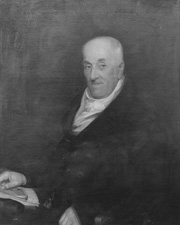 William Hindman William HindmanWilliam Hindman William Hindman was an American lawyer and statesman from Talbot County, Maryland. He represented Maryland in the Continental Congress, and in the federal Congress as both a Representative from the second and seventh districts, and as a U.S... |
Federalist Federalist Party (United States) The Federalist Party was the first American political party, from the early 1790s to 1816, the era of the First Party System, with remnants lasting into the 1820s. The Federalists controlled the federal government until 1801... |
December 12, 1800 – November 19, 1801 |
6 6th United States Congress The Sixth United States Congress was a meeting of the legislative branch of the United States federal government, consisting of the United States Senate and the United States House of Representatives. It met at Congress Hall in Philadelphia, Pennsylvania and in Washington, D.C. from March 4, 1799... (Continued) |
Elected to finish Lloyd's term | |
| 7 7th United States Congress - House of Representatives :-Senate:* President: Aaron Burr * President pro tempore:** Abraham Baldwin , first elected December 7, 1801** Stephen R. Bradley , first elected December 14, 1802-House of Representatives:... |
3 | Appointed to fill the vacancy after the Legislature failed to elect Retired when successor elected |
||||
| 4 | 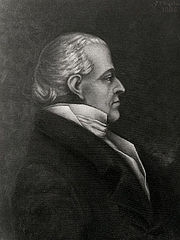 Robert Wright Robert WrightRobert Wright (politician) Robert Wright was an American politician.Wright was born at Narborough, near Chestertown, Maryland, attended the common schools, and the Kent Free School of Chestertown. He studied law, was admitted to the bar in 1773, and commenced practice in Chestertown... |
Democratic-Republican Democratic-Republican Party (United States) The Democratic-Republican Party or Republican Party was an American political party founded in the early 1790s by Thomas Jefferson and James Madison. Political scientists use the former name, while historians prefer the latter one; contemporaries generally called the party the "Republicans", along... |
November 19, 1801 – November 12, 1806 |
Elected to finish term Resigned to become Governor of Maryland Governor of Maryland The Governor of Maryland heads the executive branch of the government of Maryland, and he is the commander-in-chief of the state's National Guard units. The Governor is the highest-ranking official in the state, and he has a broad range of appointive powers in both the State and local governments,... |
||
| 8 8th United States Congress - Senate :* President: Aaron Burr * President pro tempore: John Brown , October 17, 1803 – February 26, 1804** Jesse Franklin , March 10, 1804 – November 4, 1804** Joseph Anderson , January 15, 1805 – December 1, 1805- House of Representatives :... |
||||||
| 9 9th United States Congress - Senate :* President: George Clinton * President pro tempore: Samuel Smith - House of Representatives :* Speaker: Nathaniel Macon -Members:This list is arranged by chamber, then by state... |
||||||
| Vacant | November 12, 1806 – November 25, 1806 |
|||||
| 5 | 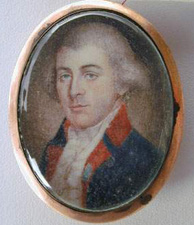 Philip Reed Philip ReedPhilip Reed Philip Reed was a United States Senator representing Maryland from 1806 to 1813.Born near Chestertown, Maryland, in 1760, Reed completed preparatory studies and served with the Continental Army during the American Revolutionary War, attaining the rank of captain of infantry... |
Democratic-Republican Democratic-Republican Party (United States) The Democratic-Republican Party or Republican Party was an American political party founded in the early 1790s by Thomas Jefferson and James Madison. Political scientists use the former name, while historians prefer the latter one; contemporaries generally called the party the "Republicans", along... |
November 25, 1806 – March 3, 1813 |
9 9th United States Congress - Senate :* President: George Clinton * President pro tempore: Samuel Smith - House of Representatives :* Speaker: Nathaniel Macon -Members:This list is arranged by chamber, then by state... (Continued) |
Elected to finish Wright's term | |
| 10 10th United States Congress - House of Representatives :- Senate :*President: George Clinton *President pro tempore: Samuel Smith , elected April 16, 1808** Stephen R. Bradley , elected December 28, 1808** John Milledge , elected January 30, 1809... |
4 | Re-elected in 1806 United States Senate elections, 1806 The United States Senate election of 1806 was an election which had the Democratic-Republican Party increase its overwhelming control of the Senate by one additional Senator.... |
||||
| 11 11th United States Congress - House of Representatives :-Leadership:- Senate :* President: George Clinton * President pro tempore:** John Milledge ** Andrew Gregg , elected June 26, 1809** John Gaillard , elected February 28, 1810... |
||||||
| 12 12th United States Congress - House of Representatives :During this congress, one new House seat was added for the new state of Louisiana.- Senate :*President: George Clinton *President pro tempore: William H. Crawford -House of Representatives:*Speaker: Henry Clay... |
||||||
| Vacant | March 3, 1813 – May 21, 1813 |
Legislature failed to elect | ||||
| 6 |  Robert Henry Goldsborough Robert Henry GoldsboroughRobert Henry Goldsborough Robert Henry Goldsborough was an American politician from Talbot County, Maryland.Goldsborough was born at "Myrtle Grove" near Easton, Maryland. He was educated by private tutors and graduated from St. John's College in Annapolis, Maryland in 1795... |
Federalist Federalist Party (United States) The Federalist Party was the first American political party, from the early 1790s to 1816, the era of the First Party System, with remnants lasting into the 1820s. The Federalists controlled the federal government until 1801... |
May 21, 1813 – March 3, 1819 |
13 13th United States Congress - Senate :* President: Elbridge Gerry , until November 23, 1814, thereafter vacant.* President pro tempore: Joseph B. Varnum , December 6, 1813 – February 3, 1814** John Gaillard , elected November 25, 1814- House of Representatives :... |
5 | Elected in 1813 to finish term |
| 14 14th United States Congress - Senate :* President: Vacant* President pro tempore: John Gaillard of South Carolina, first elected December 4, 1815- House of Representatives :* Speaker: Henry Clay of Kentucky-Members:This list is arranged by chamber, then by state... |
||||||
| 15 15th United States Congress -Leadership:- Senate :* President: Daniel D. Tompkins * President pro tempore:** John Gaillard , elected March 4, 1817** James Barbour , elected February 15, 1819- House of Representatives :*Speaker: Henry Clay -Members:... |
||||||
| 7 | 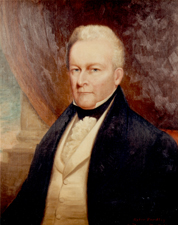 Edward Lloyd Edward LloydEdward Lloyd (Governor of Maryland) Edward Lloyd V served as the 13th Governor of Maryland from 1809 to 1811, and as a United States Senator from Maryland between 1819 and 1826. He also served as a U.S... |
Democratic-Republican Democratic-Republican Party (United States) The Democratic-Republican Party or Republican Party was an American political party founded in the early 1790s by Thomas Jefferson and James Madison. Political scientists use the former name, while historians prefer the latter one; contemporaries generally called the party the "Republicans", along... |
March 4, 1819 – January 14, 1826 |
16 16th United States Congress -House of Representatives:During this congress, one House seat was added for the new state of Alabama and one seat was reapportioned from Massachusetts to the new state of Maine. For the beginning of the next congress, six more seats from Massachusetts would be reapportioned to... |
6 | Elected in 1819 |
| 17 17th United States Congress The Seventeenth United States Congress was a meeting of the legislative branch of the United States federal government, consisting of the United States Senate and the United States House of Representatives. It met in Washington, D.C. from March 4, 1821 to March 3, 1823, during the fifth and sixth... |
||||||
| Crawford Republican Democratic-Republican Party (United States) The Democratic-Republican Party or Republican Party was an American political party founded in the early 1790s by Thomas Jefferson and James Madison. Political scientists use the former name, while historians prefer the latter one; contemporaries generally called the party the "Republicans", along... |
18 18th United States Congress The Eighteenth United States Congress was a meeting of the legislative branch of the United States federal government, consisting of the United States Senate and the United States House of Representatives. It met in Washington, D.C. from March 4, 1823 to March 3, 1825, during the seventh and eighth... |
|||||
| Jacksonian | 19 19th United States Congress -House of Representatives:-Leadership:- Senate :* President: John C. Calhoun * President pro tempore: John Gaillard , until December 4, 1825** Nathaniel Macon , from May 20, 1826- House of Representatives :* Speaker: John W. Taylor -Members:... |
7 | Re-elected in 1825 Resigned |
|||
| Vacant | January 14, 1826 – January 24, 1826 |
|||||
| 8 | Ezekiel F. Chambers Ezekiel F. Chambers Ezekiel Forman Chambers was an American politician.Born in Chestertown, Maryland, Chambers was graduated from Washington College at Chestertown in 1805. He studied law, was admitted to the bar in 1808, and commenced practice in Chestertown... |
National Republican National Republican Party (United States) The National Republicans were a political party in the United States. During the administration of John Quincy Adams , the president's supporters were referred to as Adams Men or Anti-Jackson. When Andrew Jackson was elected President of the United States in 1828, this group went into opposition... |
January 24, 1826 – December 20, 1834 |
19 19th United States Congress -House of Representatives:-Leadership:- Senate :* President: John C. Calhoun * President pro tempore: John Gaillard , until December 4, 1825** Nathaniel Macon , from May 20, 1826- House of Representatives :* Speaker: John W. Taylor -Members:... (Continued) |
Elected to finish Lloyd's term | |
| 20 20th United States Congress -House of Representatives:-Leadership:- Senate :* President: John C. Calhoun * President pro tempore: Samuel Smith - House of Representatives :* Speaker: Andrew Stevenson -Members:This list is arranged by chamber, then by state... |
||||||
| 21 21st United States Congress -House of Representatives:-Leadership:- Senate :* President: John C. Calhoun * President pro tempore: Samuel Smith - House of Representatives :* Speaker: Andrew Stevenson -Members:This list is arranged by chamber, then by state... |
||||||
| 22 22nd United States Congress -House of Representatives:-Leadership:- Senate :* President:** John C. Calhoun , resigned December 28, 1832, thereafter vacant.* President pro tempore:** Samuel Smith , first elected December 5, 1831** Littleton W... |
8 | Re-elected in 1831 Resigned to become judge of the Maryland Court of Appeals Maryland Court of Appeals The Court of Appeals of Maryland is the supreme court of the U.S. state of Maryland. The court, which is composed of one chief judge and six associate judges, meets in the Robert C. Murphy Courts of Appeal Building in the state capital, Annapolis... |
||||
| 23 23rd United States Congress -House of Representatives:For the beginning of this congress, the size of the House was increased from 213 seats to 240 seats, following the 1830 United States Census .- Leadership :- Senate :* President: Martin Van Buren... |
||||||
| Vacant | December 20, 1834 – January 13, 1835 |
|||||
| 9 |  Robert Henry Goldsborough Robert Henry GoldsboroughRobert Henry Goldsborough Robert Henry Goldsborough was an American politician from Talbot County, Maryland.Goldsborough was born at "Myrtle Grove" near Easton, Maryland. He was educated by private tutors and graduated from St. John's College in Annapolis, Maryland in 1795... |
Anti- Jacksonian |
January 13, 1835 – October 5, 1836 |
23 23rd United States Congress -House of Representatives:For the beginning of this congress, the size of the House was increased from 213 seats to 240 seats, following the 1830 United States Census .- Leadership :- Senate :* President: Martin Van Buren... (Continued) |
Elected to finish Chambers's term Died |
|
| 24 24th United States Congress -House of Representatives:During this congress one House seat was added for each of the new states of Arkansas and Michigan.-Leadership:- Senate :* President: Martin Van Buren * President pro tempore: William R. King - House of Representatives :... |
||||||
| Vacant | October 5, 1836 – December 31, 1836 |
|||||
| 10 |  John S. Spence John S. SpenceJohn S. Spence John Selby Spence was an American politician.Born near Snow Hill, Maryland, Spence attended the common schools and graduated from the medical department of the University of Pennsylvania at Philadelphia in 1809 and practiced in Worcester County, Maryland... |
Anti- Jacksonian |
December 31, 1836 – October 24, 1840 |
24 24th United States Congress -House of Representatives:During this congress one House seat was added for each of the new states of Arkansas and Michigan.-Leadership:- Senate :* President: Martin Van Buren * President pro tempore: William R. King - House of Representatives :... (Continued) |
||
| Whig Whig Party (United States) The Whig Party was a political party of the United States during the era of Jacksonian democracy. Considered integral to the Second Party System and operating from the early 1830s to the mid-1850s, the party was formed in opposition to the policies of President Andrew Jackson and his Democratic... |
25 25th United States Congress -House of Representatives:-Leadership:- Senate :* President: Richard Mentor Johnson * President pro tempore: William R. King - House of Representatives :* Speaker: James K. Polk -Members:This list is arranged by chamber, then by state... |
9 | Re-elected in 1837 Died |
|||
| 26 26th United States Congress -House of Representatives:- Leadership :- Senate :*President: Richard M. Johnson *President pro tempore: William R. King - House of Representatives :*Speaker: Robert M.T. Hunter -Members:This list is arranged by chamber, then by state... |
||||||
| Vacant | October 24, 1840 – January 5, 1841 |
|||||
| 11 | 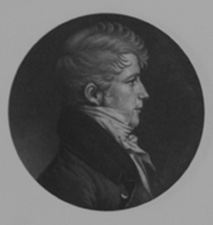 John Leeds Kerr John Leeds KerrJohn Leeds Kerr John Leeds Kerr was an American politician.-Early years:Kerr was born in 1780 at Greenbury Point near Annapolis, Maryland, and graduated from St. John’s College of Annapolis in 1799... |
Whig Whig Party (United States) The Whig Party was a political party of the United States during the era of Jacksonian democracy. Considered integral to the Second Party System and operating from the early 1830s to the mid-1850s, the party was formed in opposition to the policies of President Andrew Jackson and his Democratic... |
January 5, 1841 – March 3, 1843 |
26 26th United States Congress -House of Representatives:- Leadership :- Senate :*President: Richard M. Johnson *President pro tempore: William R. King - House of Representatives :*Speaker: Robert M.T. Hunter -Members:This list is arranged by chamber, then by state... (Continued) |
Elected to finish Spence's term |
|
| 27 27th United States Congress The Twenty-seventh United States Congress was a meeting of the legislative branch of the United States federal government, consisting of the United States Senate and the United States House of Representatives. It met in Washington, D.C. from March 4, 1841 to March 3, 1843, during the one-month... |
||||||
| 12 | 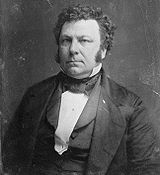 James Pearce James PearceJames Pearce James Alfred Pearce was an American politician. He was a member of the U.S. House of Representatives, representing the second district of Maryland from 1835–1839 and 1841-1843. He later served as a U.S. Senator from Maryland from 1843 until his death in 1862.Pearce was the son of Gideon Pearce... |
Whig Whig Party (United States) The Whig Party was a political party of the United States during the era of Jacksonian democracy. Considered integral to the Second Party System and operating from the early 1830s to the mid-1850s, the party was formed in opposition to the policies of President Andrew Jackson and his Democratic... |
March 4, 1843 – December 20, 1862 |
28 28th United States Congress -House of Representatives:Following the 1840 United States Census, Congress reapportioned the House to include 223 seats . During this congress, one House seat was added for the new state of Florida .- Senate :*President: Vacant... |
10 | Elected in 1843 |
| 29 29th United States Congress -House of Representatives:During this congress, two House seats were added for each of the new states of Texas and Iowa.-Leadership:-Senate:* President: George M. Dallas * President pro tempore: Willie P. Mangum... |
||||||
| 30 30th United States Congress The Thirtieth United States Congress was a meeting of the legislative branch of the United States federal government, consisting of the United States Senate and the United States House of Representatives. It met in Washington, D.C. from March 4, 1847 to March 3, 1849, during the last two years of... |
||||||
| 31 31st United States Congress The Thirty-first United States Congress was a meeting of the legislative branch of the United States federal government, consisting of the United States Senate and the United States House of Representatives. It met in Washington, D.C. from March 4, 1849 to March 3, 1851, during the last 17 months... |
11 | Re-elected in 1849 | ||||
| 32 32nd United States Congress The Thirty-second United States Congress was a meeting of the legislative branch of the United States federal government, consisting of the United States Senate and the United States House of Representatives. It met in Washington, D.C. from March 4, 1851 to March 3, 1853, during the third and... |
||||||
| 33 33rd United States Congress The Thirty-third United States Congress was a meeting of the legislative branch of the United States federal government, consisting of the United States Senate and the United States House of Representatives. It met in Washington, D.C. from March 4, 1853 to March 3, 1855, during the first two years... |
||||||
| 34 34th United States Congress The Thirty-fourth United States Congress was a meeting of the legislative branch of the United States federal government, consisting of the United States Senate and the United States House of Representatives. It met in Washington, D.C. from March 4, 1855 to March 4, 1857, during the last two years... |
12 | Re-elected in 1855 | ||||
| Democratic Democratic Party (United States) The Democratic Party is one of two major contemporary political parties in the United States, along with the Republican Party. The party's socially liberal and progressive platform is largely considered center-left in the U.S. political spectrum. The party has the lengthiest record of continuous... |
35 35th United States Congress The 35th United States Congress was a meeting of the legislative branch of the United States federal government, consisting of the United States Senate and the United States House of Representatives. It met in Washington, D.C. from March 4, 1857 to March 3, 1859, during the first two years of James... |
|||||
| 36 36th United States Congress The Thirty-sixth United States Congress was a meeting of the legislative branch of the United States federal government, consisting of the United States Senate and the United States House of Representatives. It met in Washington, D.C. from March 4, 1859 to March 4, 1861, during the third and fourth... |
||||||
| 37 37th United States Congress The Thirty-seventh United States Congress was a meeting of the legislative branch of the United States federal government, consisting of the United States Senate and the United States House of Representatives. It met in Washington, D.C. from March 4, 1861 to March 4, 1863, during the first two... |
13 | Re-elected in 1861 Died |
||||
| Vacant | December 20, 1862 – December 29, 1862 |
|||||
| 13 | 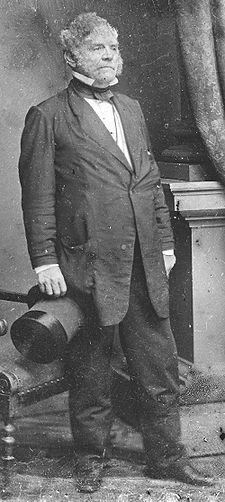 Thomas Holliday Hicks Thomas Holliday HicksThomas Holliday Hicks Thomas Holliday Hicks was an American politician from Maryland. He served as the 31st Governor of Maryland from 1858 until 1862, and as a U.S... |
Unionist Unionist Party (United States) The Union Party was a fusion political party conceived by Republicans in 1861 to combine people of all political affiliations into a single movement committed to the preservation of the Union and to war. Republicans wanted to project an image of wartime nonpartisanship and they also expected to... |
December 29, 1862 – February 14, 1865 |
37 37th United States Congress The Thirty-seventh United States Congress was a meeting of the legislative branch of the United States federal government, consisting of the United States Senate and the United States House of Representatives. It met in Washington, D.C. from March 4, 1861 to March 4, 1863, during the first two... (Continued) |
Appointed to continue Pearce's term Elected to finish Pearce's term Died |
|
| 38 38th United States Congress -House of Representatives:Before this Congress, the 1860 United States Census and resulting reapportionment changed the size of the House to 241 members... |
||||||
| Vacant | February 14, 1865 – March 9, 1865 |
38 38th United States Congress -House of Representatives:Before this Congress, the 1860 United States Census and resulting reapportionment changed the size of the House to 241 members... |
||||
| 39 39th United States Congress The Thirty-ninth United States Congress was a meeting of the legislative branch of the United States federal government, consisting of the United States Senate and the United States House of Representatives. It met in Washington, D.C. from March 4, 1865 to March 4, 1867, during the first month of... |
||||||
| 14 | 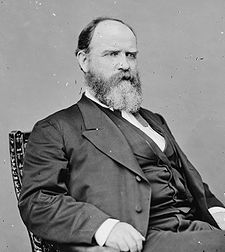 John Creswell John Creswell |
Unionist Unionist Party (United States) The Union Party was a fusion political party conceived by Republicans in 1861 to combine people of all political affiliations into a single movement committed to the preservation of the Union and to war. Republicans wanted to project an image of wartime nonpartisanship and they also expected to... |
March 9, 1865 – March 3, 1867 |
39 39th United States Congress The Thirty-ninth United States Congress was a meeting of the legislative branch of the United States federal government, consisting of the United States Senate and the United States House of Representatives. It met in Washington, D.C. from March 4, 1865 to March 4, 1867, during the first month of... (Continued) |
Elected to finish Hicks's term | |
| Vacant | March 4, 1867 – March 7, 1868 |
40 40th United States Congress The Fortieth United States Congress was a meeting of the legislative branch of the United States federal government, consisting of the United States Senate and the United States House of Representatives. It met in Washington, D.C. from March 4, 1867 to March 4, 1869, during the third and fourth... |
14 | Senator-elect Philip F. Thomas failed to qualify | ||
| 15 | 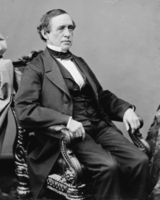 George Vickers George VickersGeorge Vickers George Vickers , a Democrat, was a United States Senator from Maryland, serving from 1868-1873. He also served in the Maryland State Senate.... |
Democratic Democratic Party (United States) The Democratic Party is one of two major contemporary political parties in the United States, along with the Republican Party. The party's socially liberal and progressive platform is largely considered center-left in the U.S. political spectrum. The party has the lengthiest record of continuous... |
March 7, 1868 – March 3, 1873 |
40 40th United States Congress The Fortieth United States Congress was a meeting of the legislative branch of the United States federal government, consisting of the United States Senate and the United States House of Representatives. It met in Washington, D.C. from March 4, 1867 to March 4, 1869, during the third and fourth... (Continued) |
Elected to finish Thomas's term |
|
| 41 41st United States Congress -House of Representatives:- Senate :* President : Schuyler Colfax* President pro tempore: Henry B. Anthony - House of Representatives :* Speaker: James G. Blaine -Members:This list is arranged by chamber, then by state... |
||||||
| 42 42nd United States Congress The Forty-second United States Congress was a meeting of the legislative branch of the United States federal government, consisting of the United States Senate and the United States House of Representatives. It met in Washington, D.C. from March 4, 1871 to March 3, 1873, during the third and fourth... |
||||||
| 16 | 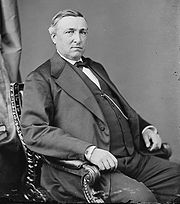 George R. Dennis George R. DennisGeorge R. Dennis George Robertson Dennis , a Democrat, was a United States Senator from Maryland, serving from 1873-1879. He also served in the Maryland State Senate and the Maryland House of Delegates.... |
Democratic Democratic Party (United States) The Democratic Party is one of two major contemporary political parties in the United States, along with the Republican Party. The party's socially liberal and progressive platform is largely considered center-left in the U.S. political spectrum. The party has the lengthiest record of continuous... |
March 4, 1873 – March 3, 1879 |
43 43rd United States Congress The Forty-third United States Congress was a meeting of the legislative branch of the United States federal government, consisting of the United States Senate and the United States House of Representatives. It met in Washington, D.C. from March 4, 1873 to March 4, 1875, during the fifth and sixth... |
15 | Elected in 1873 |
| 44 44th United States Congress The Forty-fourth United States Congress was a meeting of the legislative branch of the United States federal government, consisting of the United States Senate and the United States House of Representatives. It met in Washington, D.C. from March 4, 1875 to March 4, 1877, during the seventh and... |
||||||
| 45 45th United States Congress -House of Representatives:-Leadership:-Senate:*President: William A. Wheeler *President pro tempore: Thomas W. Ferry -House of Representatives:*Speaker: Samuel J. Randall -Members:This list is arranged by chamber, then by state... |
||||||
| 17 | 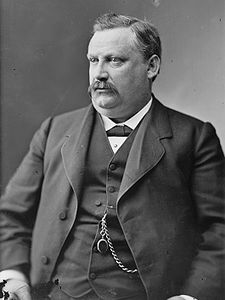 James Black Groome James Black GroomeJames Black Groome James Black Groome , a member of the United States Democratic Party, was the 36th Governor of Maryland in the United States from 1874 to 1876... |
Democratic Democratic Party (United States) The Democratic Party is one of two major contemporary political parties in the United States, along with the Republican Party. The party's socially liberal and progressive platform is largely considered center-left in the U.S. political spectrum. The party has the lengthiest record of continuous... |
March 4, 1879 – March 3, 1885 |
46 46th United States Congress The Forty-sixth United States Congress was a meeting of the legislative branch of the United States federal government, consisting of the United States Senate and the United States House of Representatives. It met in Washington, D.C. from March 4, 1879 to March 4, 1881, during the last two years of... |
16 | Elected in 1879 |
| 47 47th United States Congress The Forty-seventh United States Congress was a meeting of the legislative branch of the United States federal government, consisting of the United States Senate and the United States House of Representatives. It met in Washington, D.C. from March 4, 1881 to March 4, 1883, during the administration... |
||||||
| 48 48th United States Congress The Forty-eighth United States Congress was a meeting of the legislative branch of the United States federal government, consisting of the United States Senate and the United States House of Representatives. It met in Washington, D.C. from March 4, 1883 to March 4, 1885, during the last two years... |
||||||
| 18 | .jpg) Ephraim Wilson Ephraim WilsonEphraim King Wilson II Ephraim King Wilson II the son of Ephraim King Wilson, was a Congressional Representative and a Senator from Maryland.... |
Democratic Democratic Party (United States) The Democratic Party is one of two major contemporary political parties in the United States, along with the Republican Party. The party's socially liberal and progressive platform is largely considered center-left in the U.S. political spectrum. The party has the lengthiest record of continuous... |
March 4, 1885 – February 24, 1891 |
49 49th United States Congress The Forty-ninth United States Congress was a meeting of the legislative branch of the United States federal government, consisting of the United States Senate and the United States House of Representatives. It met in Washington, D.C. from March 4, 1885 to March 4, 1887, during the first two years... |
17 | Elected in 1884 United States Senate elections, 1884 The United States Senate election of 1884 was an election which had the Republican Party gain four seats in the United States Senate, and which coincided with the presidential election of 1884.... Died |
| 50 50th United States Congress The Fiftieth United States Congress was a meeting of the legislative branch of the United States federal government, consisting of the United States Senate and the United States House of Representatives. It met in Washington, D.C. from March 4, 1887 to March 4, 1889, during the third and fourth... |
||||||
| 51 51st United States Congress The Fifty-first United States Congress, referred to by some critics as the Billion Dollar Congress, was a meeting of the legislative branch of the United States federal government, consisting of the United States Senate and the United States House of Representatives. It met in Washington, D.C... |
||||||
| Vacant | February 24, 1891 – November 19, 1891 |
51 51st United States Congress The Fifty-first United States Congress, referred to by some critics as the Billion Dollar Congress, was a meeting of the legislative branch of the United States federal government, consisting of the United States Senate and the United States House of Representatives. It met in Washington, D.C... (Continued) |
||||
| 52 52nd United States Congress The Fifty-second United States Congress was a meeting of the legislative branch of the United States federal government, consisting of the United States Senate and the United States House of Representatives. It met in Washington, D.C... |
18 | |||||
| 19 | 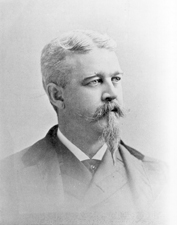 Charles Hopper Gibson Charles Hopper Gibson |
Democratic Democratic Party (United States) The Democratic Party is one of two major contemporary political parties in the United States, along with the Republican Party. The party's socially liberal and progressive platform is largely considered center-left in the U.S. political spectrum. The party has the lengthiest record of continuous... |
November 19, 1891 – March 3, 1897 |
52 52nd United States Congress The Fifty-second United States Congress was a meeting of the legislative branch of the United States federal government, consisting of the United States Senate and the United States House of Representatives. It met in Washington, D.C... (Continued) |
Appointed to continue Wilson's term Elected to finish Wilson's term |
|
| 53 53rd United States Congress The Fifty-third United States Congress was a meeting of the legislative branch of the United States federal government, consisting of the United States Senate and the United States House of Representatives. It met in Washington, D.C. from March 4, 1893 to March 4, 1895, during the fifth and sixth... |
||||||
| 54 54th United States Congress - House of Representatives :-Leadership:- Senate :* President: Adlai E. Stevenson * President pro tempore: William P. Frye - Majority leadership :* Republican Conference Chairman: John Sherman- Minority leadership :... |
||||||
| 20 | 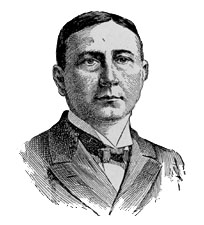 George L. Wellington George L. Wellington |
Republican Republican Party (United States) The Republican Party is one of the two major contemporary political parties in the United States, along with the Democratic Party. Founded by anti-slavery expansion activists in 1854, it is often called the GOP . The party's platform generally reflects American conservatism in the U.S... |
March 4, 1897 – March 3, 1903 |
55 55th United States Congress -House of Representatives:* Republican: 206 * Democratic: 124* Populist: 22* Silver Republican: 3* Silver: 1* Independent Republican: 1TOTAL members: 357-Leadership:-Senate:* President: Garret Hobart * President pro tempore: William P... |
19 | Elected in 1896 United States Senate elections, 1896 The United States Senate election of 1896 was an election which had the Democratic Party lose six seats in the United States Senate, mostly to minor third parties.... Retired |
| 56 56th United States Congress -House of Representatives:- Leadership :- Senate :* President: Garret Hobart , until November 21, 1899 , vacant thereafter.* President pro tempore: William P. Frye * Democratic Caucus Chairman: James K. Jones... |
||||||
| 57 57th United States Congress -House of Representatives:*Democratic: 151*Republican: 200 *Populist: 5*Silver : 1TOTAL members: 357-Leadership:-Senate:* President: Theodore Roosevelt , until September 14, 1901, vacant thereafter.... |
||||||
| 21 |  Arthur Pue Gorman Arthur Pue GormanArthur Pue Gorman Arthur Pue Gorman was a United States Senator from Maryland, serving from 1881 to 1899 and from 1903 to 1906. He also served in the Maryland House of Delegates from 1869 to 1875... |
Democratic Democratic Party (United States) The Democratic Party is one of two major contemporary political parties in the United States, along with the Republican Party. The party's socially liberal and progressive platform is largely considered center-left in the U.S. political spectrum. The party has the lengthiest record of continuous... |
March 4, 1903 – June 4, 1906 |
58 58th United States Congress - House of Representatives :* Republican : 209 * Democratic : 176* Silver Republican : 1TOTAL members: 386-Senate:* President: Vacant* President pro tempore: William P. Frye -Members:... |
20 | Elected in 1902 United States Senate elections, 1902 The United States Senate election of 1902 was an election which had the Republican Party and the Democratic Party each gain one seat in the United States Senate.... Died |
| 59 59th United States Congress The Fifty-ninth United States Congress was a meeting of the legislative branch of the United States federal government, composed of the United States Senate and the United States House of Representatives. It met in Washington, DC from March 4, 1905 to March 4, 1907, during the fifth and sixth... |
||||||
| Vacant | June 4, 1906 – June 8, 1906 |
|||||
| 22 |  William Pinkney Whyte William Pinkney WhyteWilliam Pinkney Whyte William Pinkney Whyte , a member of the United States Democratic Party, was a politician who served the State of Maryland as a State Delegate, the State Comptroller, a United States Senator, the 35th Governor, the Mayor of Baltimore, Maryland, and the State Attorney General.-Early life and... |
Democratic Democratic Party (United States) The Democratic Party is one of two major contemporary political parties in the United States, along with the Republican Party. The party's socially liberal and progressive platform is largely considered center-left in the U.S. political spectrum. The party has the lengthiest record of continuous... |
June 8, 1906 – March 17, 1908 |
59 59th United States Congress The Fifty-ninth United States Congress was a meeting of the legislative branch of the United States federal government, composed of the United States Senate and the United States House of Representatives. It met in Washington, DC from March 4, 1905 to March 4, 1907, during the fifth and sixth... (Continued) |
Appointed to continue Gorman's term Elected to finish Gorman's term Died |
|
| 60 60th United States Congress The Sixtieth United States Congress was a meeting of the legislative branch of the United States federal government, composed of the United States Senate and the United States House of Representatives. It met in Washington, DC from March 4, 1907 to March 4, 1909, during the last two years of... |
||||||
| Vacant | March 17, 1908 – March 25, 1908 |
|||||
| 23 | 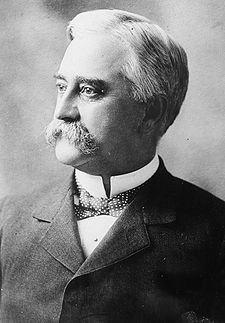 John Walter Smith John Walter SmithJohn Walter Smith John Walter Smith , a member of the United States Democratic Party, served the State of Maryland in the United States in several different positions... |
Democratic Democratic Party (United States) The Democratic Party is one of two major contemporary political parties in the United States, along with the Republican Party. The party's socially liberal and progressive platform is largely considered center-left in the U.S. political spectrum. The party has the lengthiest record of continuous... |
March 25, 1908 – March 3, 1921 |
60 60th United States Congress The Sixtieth United States Congress was a meeting of the legislative branch of the United States federal government, composed of the United States Senate and the United States House of Representatives. It met in Washington, DC from March 4, 1907 to March 4, 1909, during the last two years of... (Continued) |
Elected to finish Whyte's term | |
| 61 61st United States Congress The Sixty-first United States Congress was a meeting of the legislative branch of the United States federal government, composed of the United States Senate and the United States House of Representatives. It met in Washington, DC from March 4, 1909 to March 4, 1911, during the first two years of... |
21 | Re-elected in 1909 | ||||
| 62 62nd United States Congress - House of Representatives :* Democratic : 230 * Republican : 162* Socialist : 1* Independent : 1TOTAL members: 394-Senate:* President: James S... |
||||||
| 63 63rd United States Congress - House of Representatives:*Democratic : 291 *Republican : 134*Progressive : 9*Independent : 1TOTAL members: 435-Senate:*President of the Senate: Thomas R. Marshall*President pro tempore: James P. Clarke-Senate:... |
||||||
| 64 64th United States Congress The Sixty-fourth United States Congress was a meeting of the legislative branch of the United States federal government, composed of the United States Senate and the United States House of Representatives. It met in Washington, DC from March 4, 1915 to March 4, 1917, during the third and fourth... |
22 | Re-elected in 1914 Lost re-election |
||||
| 65 65th United States Congress The Sixty-fifth United States Congress was a meeting of the legislative branch of the United States federal government, composed of the United States Senate and the United States House of Representatives. It met in Washington, DC from March 4, 1917 to March 4, 1919, during the fourth and fifth... |
||||||
| 66 66th United States Congress The Sixty-sixth United States Congress was a meeting of the legislative branch of the United States federal government, comprising the United States Senate and the United States House of Representatives. It met in Washington, DC from March 4, 1919 to March 4, 1921, during the last two years of... |
||||||
| 24 | 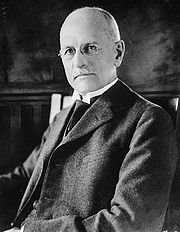 Ovington Weller Ovington WellerOvington Weller Ovington Eugene Weller was a Republican member of the United States Senate, representing the State of Maryland from 1921-1927.... |
Republican Republican Party (United States) The Republican Party is one of the two major contemporary political parties in the United States, along with the Democratic Party. Founded by anti-slavery expansion activists in 1854, it is often called the GOP . The party's platform generally reflects American conservatism in the U.S... |
March 4, 1921 – March 3, 1927 |
67 67th United States Congress The Sixty-seventh United States Congress was a meeting of the legislative branch of the United States federal government, consisting of the United States Senate and the United States House of Representatives. It met in Washington, D.C. from March 4, 1921 to March 4, 1923, during the first two years... |
23 | Elected in 1920 Lost re-election |
| 68 68th United States Congress The Sixty-eighth United States Congress was a meeting of the legislative branch of the United States federal government, consisting of the United States Senate and the United States House of Representatives. It met in Washington, D.C. from March 4, 1923 to March 4, 1925, during the last months of... |
||||||
| 69 69th United States Congress The Sixty-ninth United States Congress was a meeting of the legislative branch of the United States federal government, consisting of the United States Senate and the United States House of Representatives. It met in Washington, D.C. from March 4, 1925 to March 4, 1927, during the third and fourth... |
||||||
| 25 | 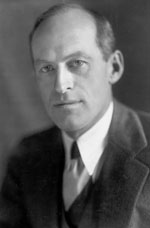 Millard E. Tydings Millard E. Tydings |
Democratic Democratic Party (United States) The Democratic Party is one of two major contemporary political parties in the United States, along with the Republican Party. The party's socially liberal and progressive platform is largely considered center-left in the U.S. political spectrum. The party has the lengthiest record of continuous... |
March 4, 1927 – January 3, 1951 |
70 70th United States Congress The Seventieth United States Congress was a meeting of the legislative branch of the United States federal government, consisting of the United States Senate and the United States House of Representatives. It met in Washington, D.C. from March 4, 1927 to March 3, 1929, during the last two years of... |
24 | Elected in 1926 |
| 71 71st United States Congress The Seventy-first United States Congress was a meeting of the legislative branch of the United States federal government, consisting of the United States Senate and the United States House of Representatives. It met in Washington, D.C. from March 4, 1929 to March 4, 1931, during the first two years... |
||||||
| 72 72nd United States Congress The Seventy-second United States Congress was a meeting of the legislative branch of the United States federal government, consisting of the United States Senate and the United States House of Representatives. It met in Washington, D.C. from March 4, 1931 to March 4, 1933, during the last two years... |
||||||
| 73 73rd United States Congress The Seventy-third United States Congress was a meeting of the legislative branch of the United States federal government, composed of the United States Senate and the United States House of Representatives. It met in Washington, DC from March 4, 1933 to January 3, 1935, during the first two years... |
25 | Re-elected in 1932 | ||||
| 74 74th United States Congress -House:Also 2 Delegates, 3 Resident Commissioners-Senate:*President of the Senate: John N. Garner *President pro tempore: Key Pittman -Majority leadership:*Majority leader: Joseph T. Robinson... |
||||||
| 75 75th United States Congress The Seventy-fifth United States Congress was a meeting of the legislative branch of the United States federal government, composed of the United States Senate and the United States House of Representatives. It met in Washington, DC from January 3, 1937 to January 3, 1939, during the first two years... |
||||||
| 76 76th United States Congress The Seventy-sixth United States Congress was a meeting of the legislative branch of the United States federal government, composed of the United States Senate and the United States House of Representatives. It met in Washington, DC from January 3, 1939 to January 3, 1941, during the seventh and... |
26 | Re-elected in 1938 | ||||
| 77 77th United States Congress -Major events:* December 7, 1941: Attack on Pearl Harbor* December 8, 1941: Joint Session of Congress met to hear President Roosevelt deliver his "Day of Infamy" speech... |
||||||
| 78 78th United States Congress The Seventy-eighth United States Congress was a meeting of the legislative branch of the United States federal government, composed of the United States Senate and the United States House of Representatives. It met in Washington, DC from January 3, 1943 to January 3, 1945, during the last two years... |
||||||
| 79 79th United States Congress The Seventy-ninth United States Congress was a meeting of the legislative branch of the United States federal government, composed of the United States Senate and the United States House of Representatives. It met in Washington, DC from January 3, 1945 to January 3, 1947, during the last months of... |
27 | Re-elected in 1944 Lost re-election |
||||
| 80 80th United States Congress The Eightieth United States Congress was a meeting of the legislative branch of the United States federal government, composed of the United States Senate and the United States House of Representatives. It met in Washington, DC from January 3, 1947 to January 3, 1949, during the third and fourth... |
||||||
| 81 81st United States Congress The Eighty-first United States Congress was a meeting of the legislative branch of the United States federal government, composed of the United States Senate and the United States House of Representatives... |
||||||
| 26 | 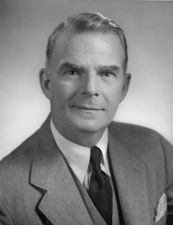 John Marshall Butler John Marshall ButlerJohn Marshall Butler John Marshall Butler was a Republican member of the United States Senate, representing the State of Maryland from 1951-1963.-Early life:Butler was born in Baltimore, Maryland and attended Baltimore public schools... |
Republican Republican Party (United States) The Republican Party is one of the two major contemporary political parties in the United States, along with the Democratic Party. Founded by anti-slavery expansion activists in 1854, it is often called the GOP . The party's platform generally reflects American conservatism in the U.S... |
January 3, 1951 – January 2, 1963 |
82 82nd United States Congress The Eighty-second United States Congress was a meeting of the legislative branch of the United States federal government, composed of the United States Senate and the United States House of Representatives. It met in Washington, DC from January 3, 1951 to January 3, 1953, during the last two years... |
28 | Elected in 1950 |
| 83 83rd United States Congress The Eighty-third United States Congress was a meeting of the legislative branch of the United States federal government, composed of the United States Senate and the United States House of Representatives. It met in Washington, DC from January 3, 1953 to January 3, 1955, during the first two years... |
||||||
| 84 84th United States Congress The Eighty-fourth United States Congress was a meeting of the legislative branch of the United States federal government, composed of the United States Senate and the United States House of Representatives. It met in Washington, DC from January 3, 1955 to January 3, 1957, during the third and... |
||||||
| 85 85th United States Congress The Eighty-fifth United States Congress was a meeting of the legislative branch of the United States federal government, composed of the United States Senate and the United States House of Representatives. It met in Washington, DC from January 3, 1957 to January 3, 1959, during the fifth and sixth... |
29 | Re-elected in 1956 Retired |
||||
| 86 86th United States Congress The Eighty-sixth United States Congress was a meeting of the legislative branch of the United States federal government, composed of the United States Senate and the United States House of Representatives. It met in Washington, DC from January 3, 1959 to January 3, 1961, during the last two years... |
||||||
| 87 87th United States Congress -House of Representatives :-Senate:* President: Richard Nixon , until January 20, 1961** Lyndon Johnson , from January 20, 1961* President pro tempore: Carl Hayden -House of Representatives:... |
||||||
| 27 |  Daniel B. Brewster Daniel B. Brewster |
Democratic Democratic Party (United States) The Democratic Party is one of two major contemporary political parties in the United States, along with the Republican Party. The party's socially liberal and progressive platform is largely considered center-left in the U.S. political spectrum. The party has the lengthiest record of continuous... |
January 3, 1963 – January 3, 1969 |
88 88th United States Congress The Eighty-eighth United States Congress was a meeting of the legislative branch of the United States federal government, composed of the United States Senate and the United States House of Representatives. It met in Washington, DC from January 3, 1963 to January 3, 1965, during the last year of... |
30 | Elected in 1962 Lost re-election |
| 89 89th United States Congress -House of Representatives:- Senate :* President of the Senate: Hubert Humphrey , starting January 20, 1965* President pro tempore: Carl Hayden - Majority leadership :* Majority Leader and Democratic Conference Chairman: Mike Mansfield... |
||||||
| 90 90th United States Congress The Ninetieth United States Congress was a meeting of the legislative branch of the United States federal government, composed of the United States Senate and the United States House of Representatives. It met in Washington, DC from January 3, 1967 to January 3, 1969, during the last two years of... |
||||||
| 28 | 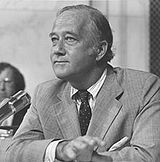 Charles Mathias Charles Mathias |
Republican Republican Party (United States) The Republican Party is one of the two major contemporary political parties in the United States, along with the Democratic Party. Founded by anti-slavery expansion activists in 1854, it is often called the GOP . The party's platform generally reflects American conservatism in the U.S... |
January 3, 1969 – January 3, 1987 |
91 91st United States Congress The Ninety-first United States Congress was a meeting of the legislative branch of the United States federal government, composed of the United States Senate and the United States House of Representatives. It met in Washington, DC from January 3, 1969 to January 3, 1971, during the first two years... |
31 | Elected in 1968 |
| 92 92nd United States Congress The Ninety-second United States Congress was a meeting of the legislative branch of the United States federal government, composed of the United States Senate and the United States House of Representatives... |
||||||
| 93 93rd United States Congress The Ninety-third United States Congress was a meeting of the legislative branch of the United States federal government, composed of the United States Senate and the United States House of Representatives. It met in Washington, DC from January 3, 1973 to January 3, 1975, during the end of Richard... |
||||||
| 94 94th United States Congress The Ninety-fourth United States Congress was a meeting of the legislative branch of the United States federal government, composed of the United States Senate and the United States House of Representatives. It met in Washington, DC from January 3, 1975 to January 3, 1977, during the administration... |
32 | Re-elected in 1974 | ||||
| 95 95th United States Congress The Ninety-fifth United States Congress was a meeting of the legislative branch of the United States federal government, composed of the United States Senate and the United States House of Representatives. It met in Washington, DC from January 3, 1977 to January 3, 1979, during the first two years... |
||||||
| 96 96th United States Congress The Ninety-sixth United States Congress was a meeting of the legislative branch of the United States federal government, composed of the United States Senate and the United States House of Representatives. It met in Washington, DC from January 3, 1979 to January 3, 1981, during the last two years... |
||||||
| 97 97th United States Congress The Ninety-seventh United States Congress was a meeting of the legislative branch of the United States federal government, composed of the United States Senate and the United States House of Representatives. It met in Washington, DC from January 3, 1981 to January 3, 1983, during the final weeks of... |
33 | Re-elected in 1980 United States Senate elections, 1980 The 1980 U.S. Senate elections coincided with Ronald Reagan's election to the Presidency. Reagan's large margin of victory over incumbent Jimmy Carter pulled in many Democratic voters and gave a huge boost to Republican senate candidates.... Retired |
||||
| 98 98th United States Congress The Ninety-eighth United States Congress was a meeting of the legislative branch of the United States federal government, composed of the United States Senate and the United States House of Representatives. It met in Washington, DC from January 3, 1983 to January 3, 1985, during the third and... |
||||||
| 99 99th United States Congress The Ninety-ninth United States Congress was a meeting of the legislative branch of the United States federal government, composed of the United States Senate and the United States House of Representatives. It met in Washington, DC from January 3, 1985 to January 3, 1987, during the fifth and sixth... |
||||||
| 29 |  Barbara Mikulski Barbara MikulskiBarbara Mikulski Barbara Ann Mikulski is the senior United States Senator from Maryland and a member of the Democratic Party. Mikulski, a former U.S. Representative, is the longest-serving female senator in U.S... |
Democratic Democratic Party (United States) The Democratic Party is one of two major contemporary political parties in the United States, along with the Republican Party. The party's socially liberal and progressive platform is largely considered center-left in the U.S. political spectrum. The party has the lengthiest record of continuous... |
January 3, 1987 – Present |
100 100th United States Congress -House of Representatives:- Senate :* President: George H.W. Bush * President pro tempore: John Stennis - Majority leadership :* Majority Leader, Democratic Conference Chairman, and Democratic Policy Committee Chairman: Robert Byrd... |
34 | Elected in 1986 United States Senate election in Maryland, 1986 The 1986 United States Senate election in Maryland was held on November 3, 1986. Incumbent Republican U.S. Senator Charles Mathias, Jr. decided to retire, instead of seeking a fourth term. Democratic nominee Barbara Mikulski won the open seat vs. Linda Chavez, who won more votes by any Republican... |
| 101 101st United States Congress The One Hundred First United States Congress was a meeting of the legislative branch of the United States federal government, composed of the United States Senate and the United States House of Representatives. It met in Washington, DC from January 3, 1989 to January 3, 1991, during the first two... |
||||||
| 102 102nd United States Congress -House of Representatives:- Senate :* President:Dan Quayle * President pro tempore: Robert Byrd - Majority leadership :* Majority Leader: George Mitchell* Majority Whip: Wendell Ford- Minority leadership :... |
||||||
| 103 103rd United States Congress - House of Representatives :- Leadership :- Senate :* President: Dan Quayle , until January 20, 1993** Al Gore , from January 20, 1993* President pro tempore: Robert Byrd - Majority leadership :* Majority Leader: George Mitchell... |
35 | Re-elected in 1992 United States Senate election in Maryland, 1992 The 1992 United States Senate election in Maryland was held on November 3, 1992. Incumbent Democratic U.S. Senator Barbara Mikulski won re-election to a second term.-Candidates:*Barbara Mikulski, incumbent U.S. Senator*Thomas M... |
||||
| 104 104th United States Congress The One Hundred Fourth United States Congress was a meeting of the legislative branch of the United States federal government, composed of the United States Senate and the United States House of Representatives. It met in Washington, DC from January 3, 1995 to January 3, 1997, during the third and... |
||||||
| 105 105th United States Congress The One Hundred Fifth United States Congress was a meeting of the legislative branch of the United States federal government, composed of the United States Senate and the United States House of Representatives. It met in Washington, DC from January 3, 1997 to January 3, 1999, during the fifth and... |
||||||
| 106 106th United States Congress The One Hundred Sixth United States Congress was a meeting of the legislative branch of the United States federal government, composed of the United States Senate and the United States House of Representatives. It met in Washington, DC from January 3, 1999 to January 3, 2001, during the last two... |
36 | Re-elected in 1998 United States Senate election in Maryland, 1998 The 1998 United States Senate election in Maryland was held on November 3, 2004. Incumbent Democrat U.S. Senator Barbara Mikulski won re-election to a third term.-Results:-Candidates:*Ross Pierpont*John Taylor*Michael Gloth*Kenneth Wayman... |
||||
| 107 107th United States Congress The One Hundred Seventh United States Congress was a meeting of the legislative branch of the United States federal government, composed of the United States Senate and the United States House of Representatives. It met in Washington, D.C. from January 3, 2001 to January 3, 2003, during the final... |
||||||
| 108 108th United States Congress The One Hundred Eighth United States Congress was the legislative branch of the United States federal government, composed of the United States Senate and the United States House of Representatives from January 3, 2003 to January 3, 2005, during the third and fourth years of George W. Bush's... |
||||||
| 109 109th United States Congress The One Hundred Ninth United States Congress was the legislative branch of the United States, composed of the United States Senate and the United States House of Representatives, from January 3, 2005 to January 3, 2007, during the fifth and sixth years of George W. Bush's presidency. House members... |
37 | Re-elected in 2004 United States Senate election in Maryland, 2004 The 2004 United States Senate election in Maryland was held on November 2, 2004. Incumbent Democrat U.S. Senator Barbara Mikulski won re-election to a fourth term.- Candidates :*Barbara Mikulski, incumbent U.S. Senator*Robert Kaufman, social organizer... |
||||
| 110 110th United States Congress The One Hundred Tenth United States Congress was the meeting of the legislative branch of the United States federal government, between January 3, 2007, and January 3, 2009, during the last two years of the second term of President George W. Bush. It was composed of the Senate and the House of... |
||||||
| 111 111th United States Congress The One Hundred Eleventh United States Congress was the meeting of the legislative branch of the United States federal government from January 3, 2009 until January 3, 2011. It began during the last two weeks of the George W. Bush administration, with the remainder spanning the first two years of... |
||||||
| 112 112th United States Congress The One Hundred Twelfth United States Congress is the current meeting of the legislative branch of the United States federal government, composed of the United States Senate and the United States House of Representatives. It convened in Washington, D.C. on January 3, 2011, and will end on January... |
38 | Re-elected in 2010 United States Senate election in Maryland, 2010 The 2010 United States Senate election in Maryland was held on November 2, 2010. Primary elections were held on September 14, 2010. Incumbent Democratic U.S. Senator Barbara Mikulski won re-election to a fifth term.-Background:... |
||||
| 113 113th United States Congress The One Hundred Thirteenth United States Congress will be the next meeting of the legislative branch of the United States federal government after the 112th Congress is seated. It will be composed of the United States Senate and the United States House of Representatives. It is scheduled to meet... |
||||||
| 114 | ||||||
See also
- United States congressional delegations from MarylandUnited States Congressional Delegations from MarylandThese are tables of congressional delegations from Maryland to the United States Senate and United States House of Representatives.-United States Senate:The alternating grey and white boxes indicate the duration of the actual six-year Senate terms....
- List of United States Representatives from Maryland

